Evolution of Military Actions Related to the Role of the U.S and United Nations in Iraq
VerifiedAdded on 2023/04/23
|17
|5202
|361
AI Summary
This paper describes the evolution of military actions related to the role of the U.S and United Nations in Iraq from 1991 to 2003. It also provides a comprehensive analysis of the international crisis that led to and resulted from the 1990 Iraq invasion into Kuwait. The paper discusses the changes in American public judgment, the Security Council's role on Iraq, and the US's control over West Asia.
Contribute Materials
Your contribution can guide someone’s learning journey. Share your
documents today.
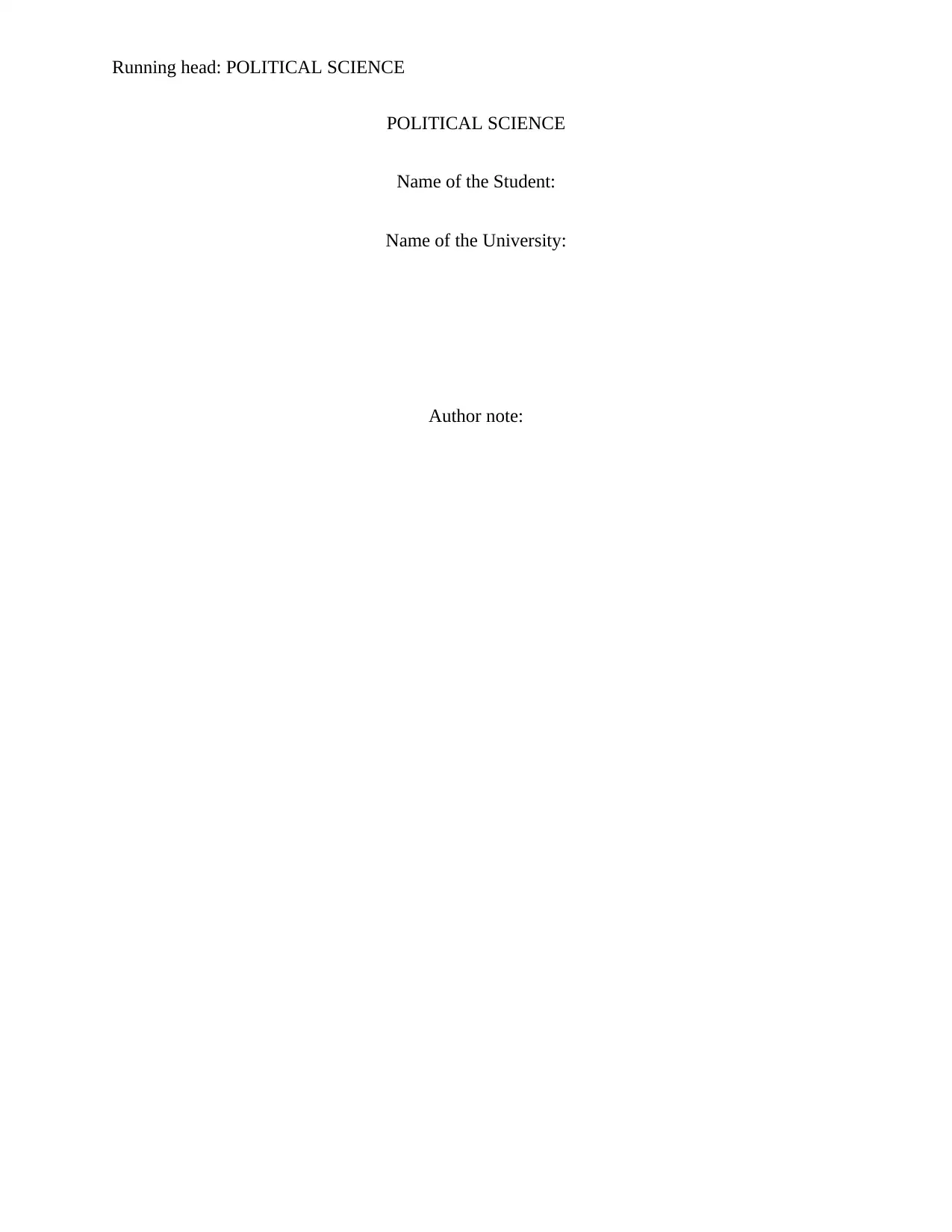
Running head: POLITICAL SCIENCE
POLITICAL SCIENCE
Name of the Student:
Name of the University:
Author note:
POLITICAL SCIENCE
Name of the Student:
Name of the University:
Author note:
Secure Best Marks with AI Grader
Need help grading? Try our AI Grader for instant feedback on your assignments.
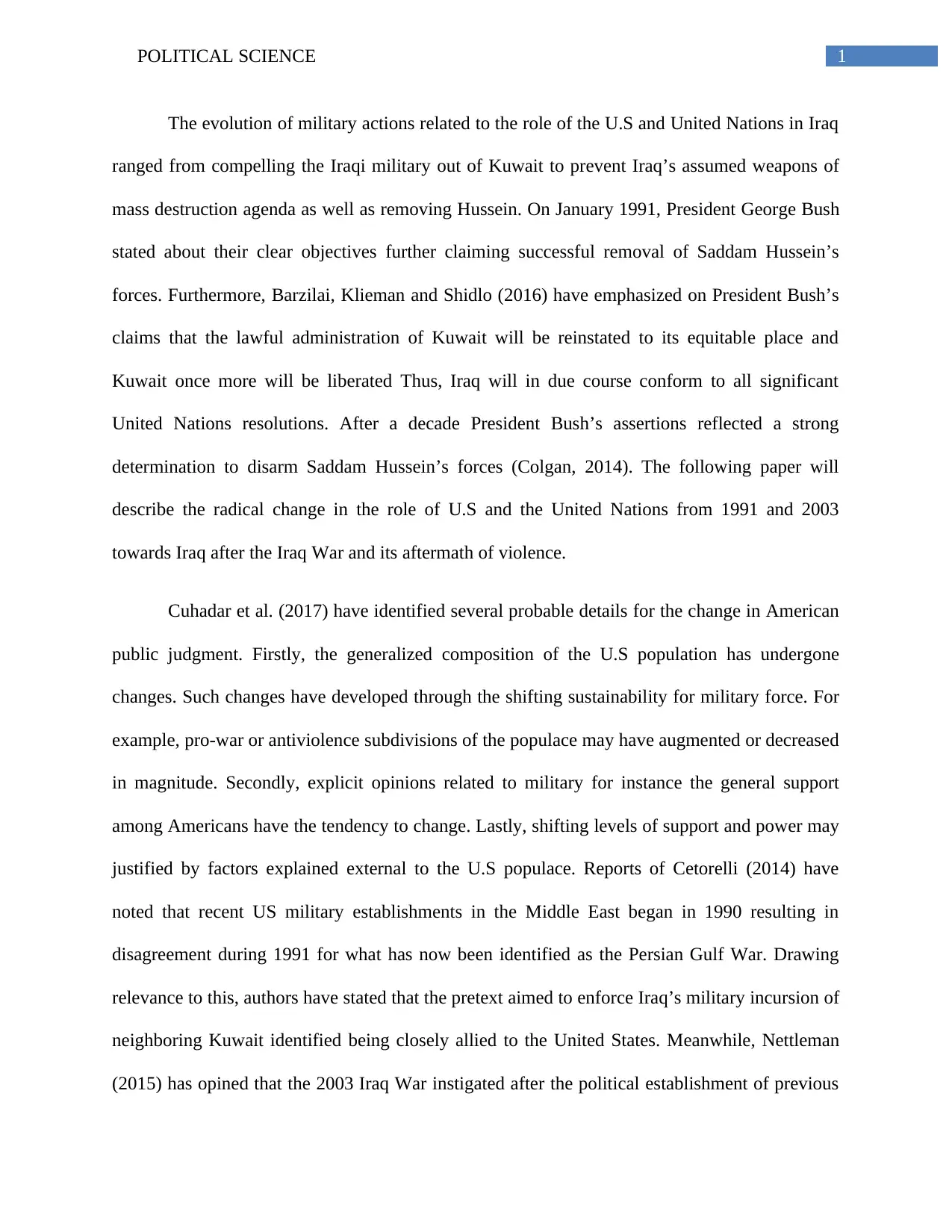
1POLITICAL SCIENCE
The evolution of military actions related to the role of the U.S and United Nations in Iraq
ranged from compelling the Iraqi military out of Kuwait to prevent Iraq’s assumed weapons of
mass destruction agenda as well as removing Hussein. On January 1991, President George Bush
stated about their clear objectives further claiming successful removal of Saddam Hussein’s
forces. Furthermore, Barzilai, Klieman and Shidlo (2016) have emphasized on President Bush’s
claims that the lawful administration of Kuwait will be reinstated to its equitable place and
Kuwait once more will be liberated Thus, Iraq will in due course conform to all significant
United Nations resolutions. After a decade President Bush’s assertions reflected a strong
determination to disarm Saddam Hussein’s forces (Colgan, 2014). The following paper will
describe the radical change in the role of U.S and the United Nations from 1991 and 2003
towards Iraq after the Iraq War and its aftermath of violence.
Cuhadar et al. (2017) have identified several probable details for the change in American
public judgment. Firstly, the generalized composition of the U.S population has undergone
changes. Such changes have developed through the shifting sustainability for military force. For
example, pro-war or antiviolence subdivisions of the populace may have augmented or decreased
in magnitude. Secondly, explicit opinions related to military for instance the general support
among Americans have the tendency to change. Lastly, shifting levels of support and power may
justified by factors explained external to the U.S populace. Reports of Cetorelli (2014) have
noted that recent US military establishments in the Middle East began in 1990 resulting in
disagreement during 1991 for what has now been identified as the Persian Gulf War. Drawing
relevance to this, authors have stated that the pretext aimed to enforce Iraq’s military incursion of
neighboring Kuwait identified being closely allied to the United States. Meanwhile, Nettleman
(2015) has opined that the 2003 Iraq War instigated after the political establishment of previous
The evolution of military actions related to the role of the U.S and United Nations in Iraq
ranged from compelling the Iraqi military out of Kuwait to prevent Iraq’s assumed weapons of
mass destruction agenda as well as removing Hussein. On January 1991, President George Bush
stated about their clear objectives further claiming successful removal of Saddam Hussein’s
forces. Furthermore, Barzilai, Klieman and Shidlo (2016) have emphasized on President Bush’s
claims that the lawful administration of Kuwait will be reinstated to its equitable place and
Kuwait once more will be liberated Thus, Iraq will in due course conform to all significant
United Nations resolutions. After a decade President Bush’s assertions reflected a strong
determination to disarm Saddam Hussein’s forces (Colgan, 2014). The following paper will
describe the radical change in the role of U.S and the United Nations from 1991 and 2003
towards Iraq after the Iraq War and its aftermath of violence.
Cuhadar et al. (2017) have identified several probable details for the change in American
public judgment. Firstly, the generalized composition of the U.S population has undergone
changes. Such changes have developed through the shifting sustainability for military force. For
example, pro-war or antiviolence subdivisions of the populace may have augmented or decreased
in magnitude. Secondly, explicit opinions related to military for instance the general support
among Americans have the tendency to change. Lastly, shifting levels of support and power may
justified by factors explained external to the U.S populace. Reports of Cetorelli (2014) have
noted that recent US military establishments in the Middle East began in 1990 resulting in
disagreement during 1991 for what has now been identified as the Persian Gulf War. Drawing
relevance to this, authors have stated that the pretext aimed to enforce Iraq’s military incursion of
neighboring Kuwait identified being closely allied to the United States. Meanwhile, Nettleman
(2015) has opined that the 2003 Iraq War instigated after the political establishment of previous
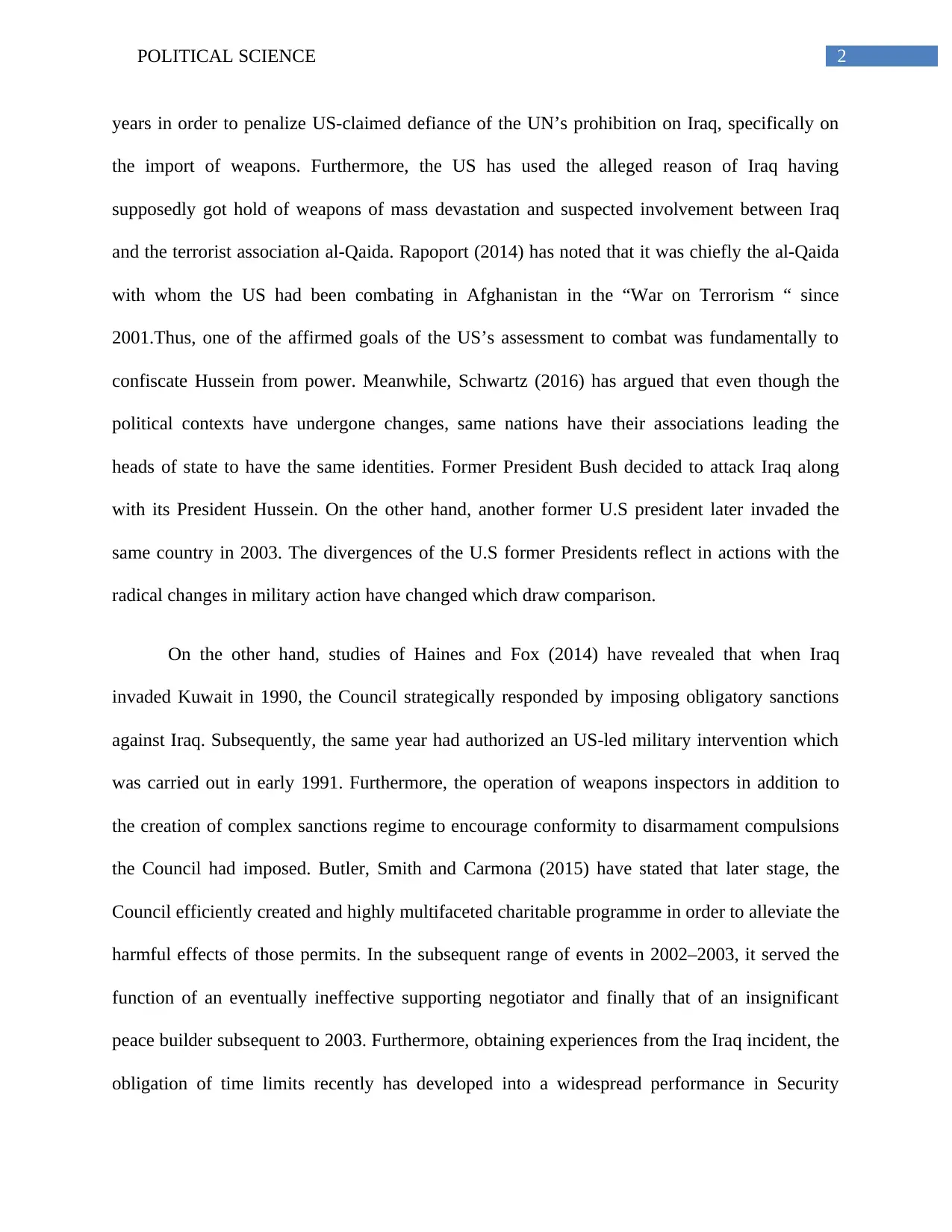
2POLITICAL SCIENCE
years in order to penalize US-claimed defiance of the UN’s prohibition on Iraq, specifically on
the import of weapons. Furthermore, the US has used the alleged reason of Iraq having
supposedly got hold of weapons of mass devastation and suspected involvement between Iraq
and the terrorist association al-Qaida. Rapoport (2014) has noted that it was chiefly the al-Qaida
with whom the US had been combating in Afghanistan in the “War on Terrorism “ since
2001.Thus, one of the affirmed goals of the US’s assessment to combat was fundamentally to
confiscate Hussein from power. Meanwhile, Schwartz (2016) has argued that even though the
political contexts have undergone changes, same nations have their associations leading the
heads of state to have the same identities. Former President Bush decided to attack Iraq along
with its President Hussein. On the other hand, another former U.S president later invaded the
same country in 2003. The divergences of the U.S former Presidents reflect in actions with the
radical changes in military action have changed which draw comparison.
On the other hand, studies of Haines and Fox (2014) have revealed that when Iraq
invaded Kuwait in 1990, the Council strategically responded by imposing obligatory sanctions
against Iraq. Subsequently, the same year had authorized an US-led military intervention which
was carried out in early 1991. Furthermore, the operation of weapons inspectors in addition to
the creation of complex sanctions regime to encourage conformity to disarmament compulsions
the Council had imposed. Butler, Smith and Carmona (2015) have stated that later stage, the
Council efficiently created and highly multifaceted charitable programme in order to alleviate the
harmful effects of those permits. In the subsequent range of events in 2002–2003, it served the
function of an eventually ineffective supporting negotiator and finally that of an insignificant
peace builder subsequent to 2003. Furthermore, obtaining experiences from the Iraq incident, the
obligation of time limits recently has developed into a widespread performance in Security
years in order to penalize US-claimed defiance of the UN’s prohibition on Iraq, specifically on
the import of weapons. Furthermore, the US has used the alleged reason of Iraq having
supposedly got hold of weapons of mass devastation and suspected involvement between Iraq
and the terrorist association al-Qaida. Rapoport (2014) has noted that it was chiefly the al-Qaida
with whom the US had been combating in Afghanistan in the “War on Terrorism “ since
2001.Thus, one of the affirmed goals of the US’s assessment to combat was fundamentally to
confiscate Hussein from power. Meanwhile, Schwartz (2016) has argued that even though the
political contexts have undergone changes, same nations have their associations leading the
heads of state to have the same identities. Former President Bush decided to attack Iraq along
with its President Hussein. On the other hand, another former U.S president later invaded the
same country in 2003. The divergences of the U.S former Presidents reflect in actions with the
radical changes in military action have changed which draw comparison.
On the other hand, studies of Haines and Fox (2014) have revealed that when Iraq
invaded Kuwait in 1990, the Council strategically responded by imposing obligatory sanctions
against Iraq. Subsequently, the same year had authorized an US-led military intervention which
was carried out in early 1991. Furthermore, the operation of weapons inspectors in addition to
the creation of complex sanctions regime to encourage conformity to disarmament compulsions
the Council had imposed. Butler, Smith and Carmona (2015) have stated that later stage, the
Council efficiently created and highly multifaceted charitable programme in order to alleviate the
harmful effects of those permits. In the subsequent range of events in 2002–2003, it served the
function of an eventually ineffective supporting negotiator and finally that of an insignificant
peace builder subsequent to 2003. Furthermore, obtaining experiences from the Iraq incident, the
obligation of time limits recently has developed into a widespread performance in Security
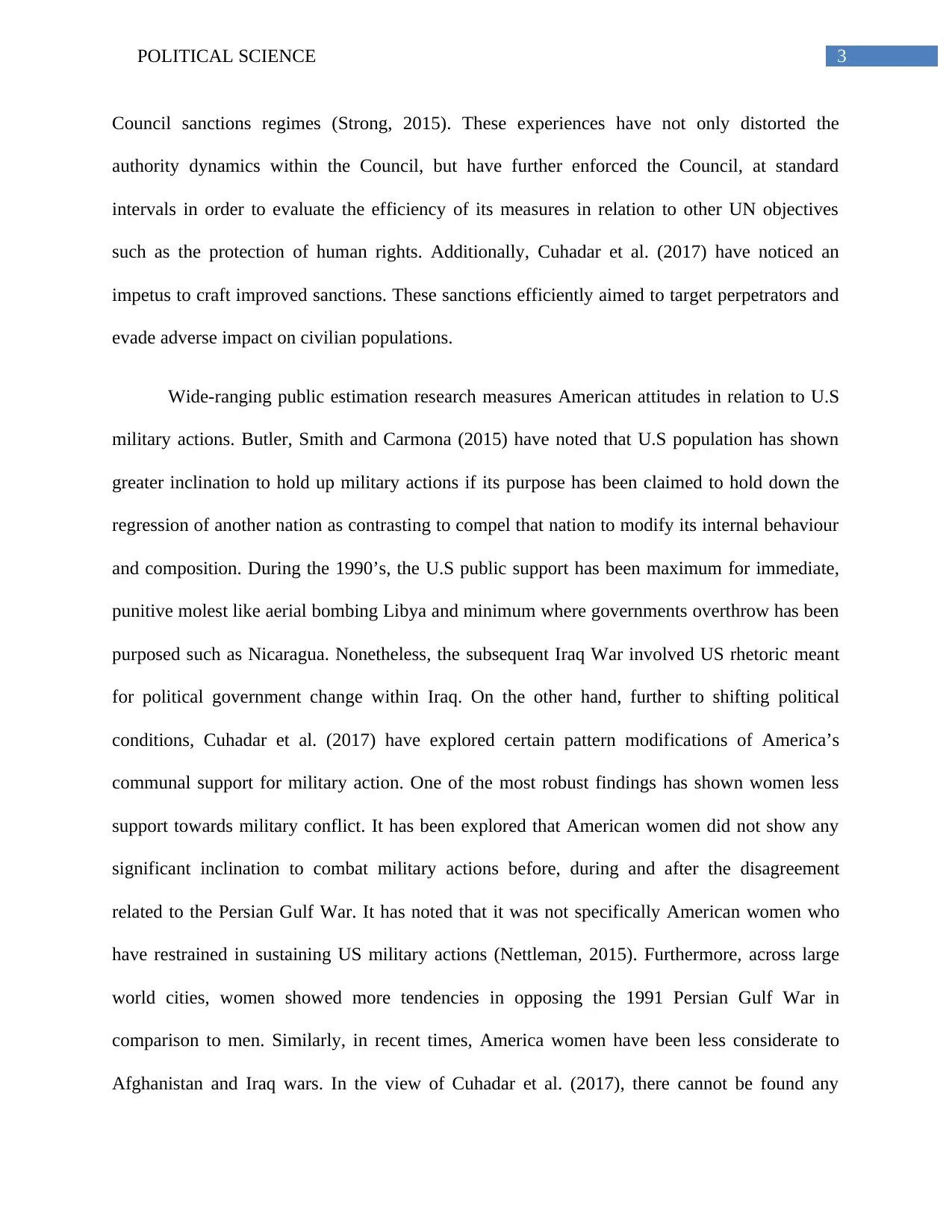
3POLITICAL SCIENCE
Council sanctions regimes (Strong, 2015). These experiences have not only distorted the
authority dynamics within the Council, but have further enforced the Council, at standard
intervals in order to evaluate the efficiency of its measures in relation to other UN objectives
such as the protection of human rights. Additionally, Cuhadar et al. (2017) have noticed an
impetus to craft improved sanctions. These sanctions efficiently aimed to target perpetrators and
evade adverse impact on civilian populations.
Wide-ranging public estimation research measures American attitudes in relation to U.S
military actions. Butler, Smith and Carmona (2015) have noted that U.S population has shown
greater inclination to hold up military actions if its purpose has been claimed to hold down the
regression of another nation as contrasting to compel that nation to modify its internal behaviour
and composition. During the 1990’s, the U.S public support has been maximum for immediate,
punitive molest like aerial bombing Libya and minimum where governments overthrow has been
purposed such as Nicaragua. Nonetheless, the subsequent Iraq War involved US rhetoric meant
for political government change within Iraq. On the other hand, further to shifting political
conditions, Cuhadar et al. (2017) have explored certain pattern modifications of America’s
communal support for military action. One of the most robust findings has shown women less
support towards military conflict. It has been explored that American women did not show any
significant inclination to combat military actions before, during and after the disagreement
related to the Persian Gulf War. It has noted that it was not specifically American women who
have restrained in sustaining US military actions (Nettleman, 2015). Furthermore, across large
world cities, women showed more tendencies in opposing the 1991 Persian Gulf War in
comparison to men. Similarly, in recent times, America women have been less considerate to
Afghanistan and Iraq wars. In the view of Cuhadar et al. (2017), there cannot be found any
Council sanctions regimes (Strong, 2015). These experiences have not only distorted the
authority dynamics within the Council, but have further enforced the Council, at standard
intervals in order to evaluate the efficiency of its measures in relation to other UN objectives
such as the protection of human rights. Additionally, Cuhadar et al. (2017) have noticed an
impetus to craft improved sanctions. These sanctions efficiently aimed to target perpetrators and
evade adverse impact on civilian populations.
Wide-ranging public estimation research measures American attitudes in relation to U.S
military actions. Butler, Smith and Carmona (2015) have noted that U.S population has shown
greater inclination to hold up military actions if its purpose has been claimed to hold down the
regression of another nation as contrasting to compel that nation to modify its internal behaviour
and composition. During the 1990’s, the U.S public support has been maximum for immediate,
punitive molest like aerial bombing Libya and minimum where governments overthrow has been
purposed such as Nicaragua. Nonetheless, the subsequent Iraq War involved US rhetoric meant
for political government change within Iraq. On the other hand, further to shifting political
conditions, Cuhadar et al. (2017) have explored certain pattern modifications of America’s
communal support for military action. One of the most robust findings has shown women less
support towards military conflict. It has been explored that American women did not show any
significant inclination to combat military actions before, during and after the disagreement
related to the Persian Gulf War. It has noted that it was not specifically American women who
have restrained in sustaining US military actions (Nettleman, 2015). Furthermore, across large
world cities, women showed more tendencies in opposing the 1991 Persian Gulf War in
comparison to men. Similarly, in recent times, America women have been less considerate to
Afghanistan and Iraq wars. In the view of Cuhadar et al. (2017), there cannot be found any
Secure Best Marks with AI Grader
Need help grading? Try our AI Grader for instant feedback on your assignments.
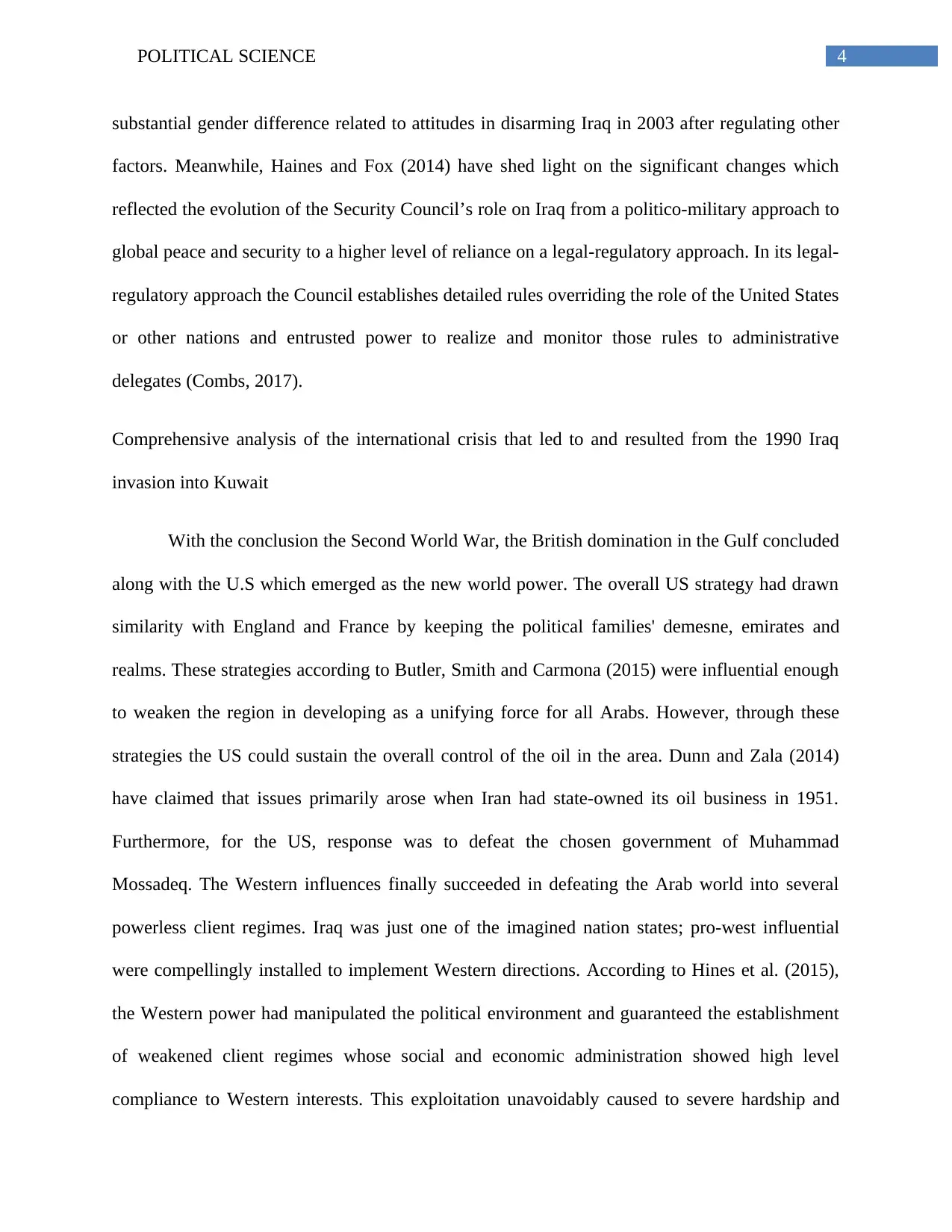
4POLITICAL SCIENCE
substantial gender difference related to attitudes in disarming Iraq in 2003 after regulating other
factors. Meanwhile, Haines and Fox (2014) have shed light on the significant changes which
reflected the evolution of the Security Council’s role on Iraq from a politico-military approach to
global peace and security to a higher level of reliance on a legal-regulatory approach. In its legal-
regulatory approach the Council establishes detailed rules overriding the role of the United States
or other nations and entrusted power to realize and monitor those rules to administrative
delegates (Combs, 2017).
Comprehensive analysis of the international crisis that led to and resulted from the 1990 Iraq
invasion into Kuwait
With the conclusion the Second World War, the British domination in the Gulf concluded
along with the U.S which emerged as the new world power. The overall US strategy had drawn
similarity with England and France by keeping the political families' demesne, emirates and
realms. These strategies according to Butler, Smith and Carmona (2015) were influential enough
to weaken the region in developing as a unifying force for all Arabs. However, through these
strategies the US could sustain the overall control of the oil in the area. Dunn and Zala (2014)
have claimed that issues primarily arose when Iran had state-owned its oil business in 1951.
Furthermore, for the US, response was to defeat the chosen government of Muhammad
Mossadeq. The Western influences finally succeeded in defeating the Arab world into several
powerless client regimes. Iraq was just one of the imagined nation states; pro-west influential
were compellingly installed to implement Western directions. According to Hines et al. (2015),
the Western power had manipulated the political environment and guaranteed the establishment
of weakened client regimes whose social and economic administration showed high level
compliance to Western interests. This exploitation unavoidably caused to severe hardship and
substantial gender difference related to attitudes in disarming Iraq in 2003 after regulating other
factors. Meanwhile, Haines and Fox (2014) have shed light on the significant changes which
reflected the evolution of the Security Council’s role on Iraq from a politico-military approach to
global peace and security to a higher level of reliance on a legal-regulatory approach. In its legal-
regulatory approach the Council establishes detailed rules overriding the role of the United States
or other nations and entrusted power to realize and monitor those rules to administrative
delegates (Combs, 2017).
Comprehensive analysis of the international crisis that led to and resulted from the 1990 Iraq
invasion into Kuwait
With the conclusion the Second World War, the British domination in the Gulf concluded
along with the U.S which emerged as the new world power. The overall US strategy had drawn
similarity with England and France by keeping the political families' demesne, emirates and
realms. These strategies according to Butler, Smith and Carmona (2015) were influential enough
to weaken the region in developing as a unifying force for all Arabs. However, through these
strategies the US could sustain the overall control of the oil in the area. Dunn and Zala (2014)
have claimed that issues primarily arose when Iran had state-owned its oil business in 1951.
Furthermore, for the US, response was to defeat the chosen government of Muhammad
Mossadeq. The Western influences finally succeeded in defeating the Arab world into several
powerless client regimes. Iraq was just one of the imagined nation states; pro-west influential
were compellingly installed to implement Western directions. According to Hines et al. (2015),
the Western power had manipulated the political environment and guaranteed the establishment
of weakened client regimes whose social and economic administration showed high level
compliance to Western interests. This exploitation unavoidably caused to severe hardship and
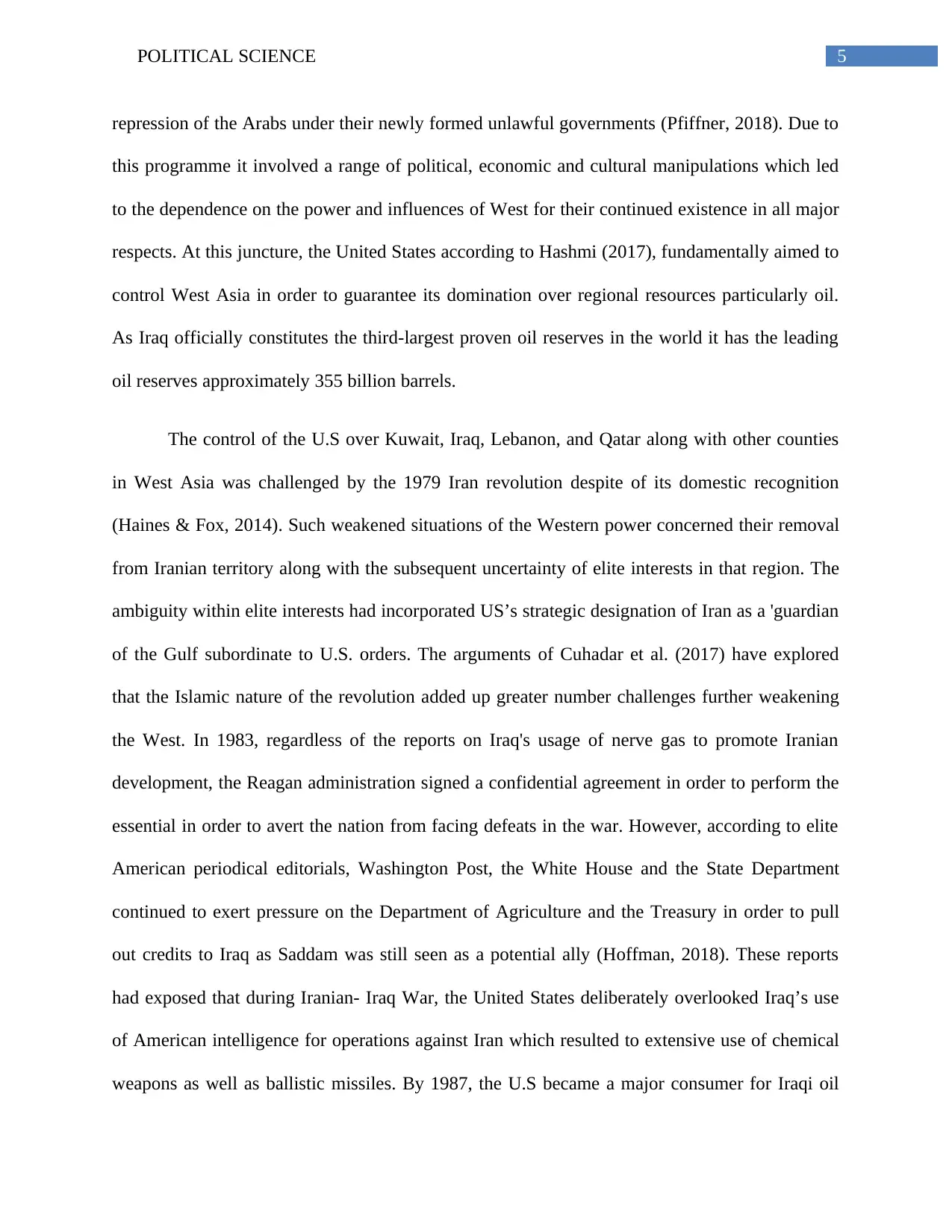
5POLITICAL SCIENCE
repression of the Arabs under their newly formed unlawful governments (Pfiffner, 2018). Due to
this programme it involved a range of political, economic and cultural manipulations which led
to the dependence on the power and influences of West for their continued existence in all major
respects. At this juncture, the United States according to Hashmi (2017), fundamentally aimed to
control West Asia in order to guarantee its domination over regional resources particularly oil.
As Iraq officially constitutes the third-largest proven oil reserves in the world it has the leading
oil reserves approximately 355 billion barrels.
The control of the U.S over Kuwait, Iraq, Lebanon, and Qatar along with other counties
in West Asia was challenged by the 1979 Iran revolution despite of its domestic recognition
(Haines & Fox, 2014). Such weakened situations of the Western power concerned their removal
from Iranian territory along with the subsequent uncertainty of elite interests in that region. The
ambiguity within elite interests had incorporated US’s strategic designation of Iran as a 'guardian
of the Gulf subordinate to U.S. orders. The arguments of Cuhadar et al. (2017) have explored
that the Islamic nature of the revolution added up greater number challenges further weakening
the West. In 1983, regardless of the reports on Iraq's usage of nerve gas to promote Iranian
development, the Reagan administration signed a confidential agreement in order to perform the
essential in order to avert the nation from facing defeats in the war. However, according to elite
American periodical editorials, Washington Post, the White House and the State Department
continued to exert pressure on the Department of Agriculture and the Treasury in order to pull
out credits to Iraq as Saddam was still seen as a potential ally (Hoffman, 2018). These reports
had exposed that during Iranian- Iraq War, the United States deliberately overlooked Iraq’s use
of American intelligence for operations against Iran which resulted to extensive use of chemical
weapons as well as ballistic missiles. By 1987, the U.S became a major consumer for Iraqi oil
repression of the Arabs under their newly formed unlawful governments (Pfiffner, 2018). Due to
this programme it involved a range of political, economic and cultural manipulations which led
to the dependence on the power and influences of West for their continued existence in all major
respects. At this juncture, the United States according to Hashmi (2017), fundamentally aimed to
control West Asia in order to guarantee its domination over regional resources particularly oil.
As Iraq officially constitutes the third-largest proven oil reserves in the world it has the leading
oil reserves approximately 355 billion barrels.
The control of the U.S over Kuwait, Iraq, Lebanon, and Qatar along with other counties
in West Asia was challenged by the 1979 Iran revolution despite of its domestic recognition
(Haines & Fox, 2014). Such weakened situations of the Western power concerned their removal
from Iranian territory along with the subsequent uncertainty of elite interests in that region. The
ambiguity within elite interests had incorporated US’s strategic designation of Iran as a 'guardian
of the Gulf subordinate to U.S. orders. The arguments of Cuhadar et al. (2017) have explored
that the Islamic nature of the revolution added up greater number challenges further weakening
the West. In 1983, regardless of the reports on Iraq's usage of nerve gas to promote Iranian
development, the Reagan administration signed a confidential agreement in order to perform the
essential in order to avert the nation from facing defeats in the war. However, according to elite
American periodical editorials, Washington Post, the White House and the State Department
continued to exert pressure on the Department of Agriculture and the Treasury in order to pull
out credits to Iraq as Saddam was still seen as a potential ally (Hoffman, 2018). These reports
had exposed that during Iranian- Iraq War, the United States deliberately overlooked Iraq’s use
of American intelligence for operations against Iran which resulted to extensive use of chemical
weapons as well as ballistic missiles. By 1987, the U.S became a major consumer for Iraqi oil
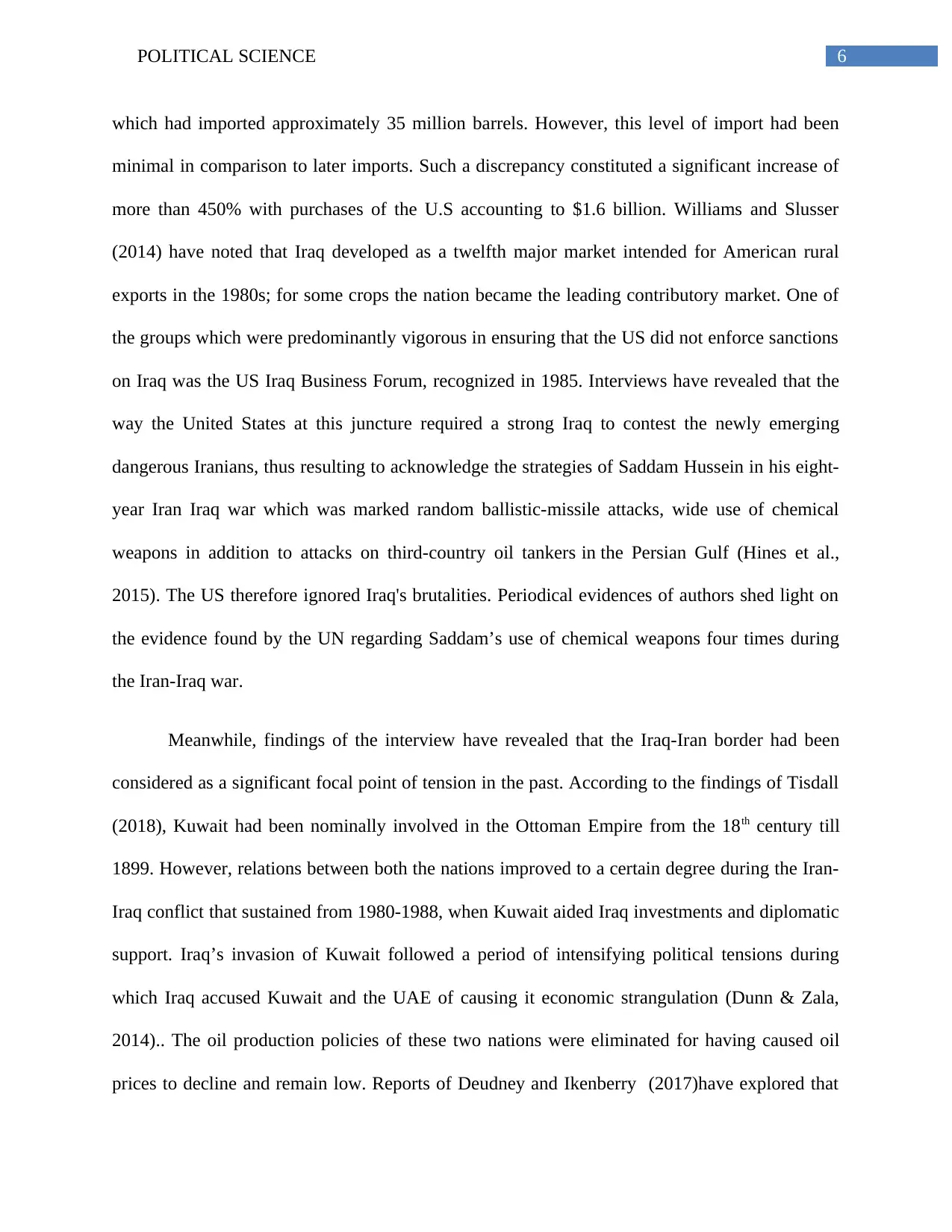
6POLITICAL SCIENCE
which had imported approximately 35 million barrels. However, this level of import had been
minimal in comparison to later imports. Such a discrepancy constituted a significant increase of
more than 450% with purchases of the U.S accounting to $1.6 billion. Williams and Slusser
(2014) have noted that Iraq developed as a twelfth major market intended for American rural
exports in the 1980s; for some crops the nation became the leading contributory market. One of
the groups which were predominantly vigorous in ensuring that the US did not enforce sanctions
on Iraq was the US Iraq Business Forum, recognized in 1985. Interviews have revealed that the
way the United States at this juncture required a strong Iraq to contest the newly emerging
dangerous Iranians, thus resulting to acknowledge the strategies of Saddam Hussein in his eight-
year Iran Iraq war which was marked random ballistic-missile attacks, wide use of chemical
weapons in addition to attacks on third-country oil tankers in the Persian Gulf (Hines et al.,
2015). The US therefore ignored Iraq's brutalities. Periodical evidences of authors shed light on
the evidence found by the UN regarding Saddam’s use of chemical weapons four times during
the Iran-Iraq war.
Meanwhile, findings of the interview have revealed that the Iraq-Iran border had been
considered as a significant focal point of tension in the past. According to the findings of Tisdall
(2018), Kuwait had been nominally involved in the Ottoman Empire from the 18th century till
1899. However, relations between both the nations improved to a certain degree during the Iran-
Iraq conflict that sustained from 1980-1988, when Kuwait aided Iraq investments and diplomatic
support. Iraq’s invasion of Kuwait followed a period of intensifying political tensions during
which Iraq accused Kuwait and the UAE of causing it economic strangulation (Dunn & Zala,
2014).. The oil production policies of these two nations were eliminated for having caused oil
prices to decline and remain low. Reports of Deudney and Ikenberry (2017)have explored that
which had imported approximately 35 million barrels. However, this level of import had been
minimal in comparison to later imports. Such a discrepancy constituted a significant increase of
more than 450% with purchases of the U.S accounting to $1.6 billion. Williams and Slusser
(2014) have noted that Iraq developed as a twelfth major market intended for American rural
exports in the 1980s; for some crops the nation became the leading contributory market. One of
the groups which were predominantly vigorous in ensuring that the US did not enforce sanctions
on Iraq was the US Iraq Business Forum, recognized in 1985. Interviews have revealed that the
way the United States at this juncture required a strong Iraq to contest the newly emerging
dangerous Iranians, thus resulting to acknowledge the strategies of Saddam Hussein in his eight-
year Iran Iraq war which was marked random ballistic-missile attacks, wide use of chemical
weapons in addition to attacks on third-country oil tankers in the Persian Gulf (Hines et al.,
2015). The US therefore ignored Iraq's brutalities. Periodical evidences of authors shed light on
the evidence found by the UN regarding Saddam’s use of chemical weapons four times during
the Iran-Iraq war.
Meanwhile, findings of the interview have revealed that the Iraq-Iran border had been
considered as a significant focal point of tension in the past. According to the findings of Tisdall
(2018), Kuwait had been nominally involved in the Ottoman Empire from the 18th century till
1899. However, relations between both the nations improved to a certain degree during the Iran-
Iraq conflict that sustained from 1980-1988, when Kuwait aided Iraq investments and diplomatic
support. Iraq’s invasion of Kuwait followed a period of intensifying political tensions during
which Iraq accused Kuwait and the UAE of causing it economic strangulation (Dunn & Zala,
2014).. The oil production policies of these two nations were eliminated for having caused oil
prices to decline and remain low. Reports of Deudney and Ikenberry (2017)have explored that
Paraphrase This Document
Need a fresh take? Get an instant paraphrase of this document with our AI Paraphraser
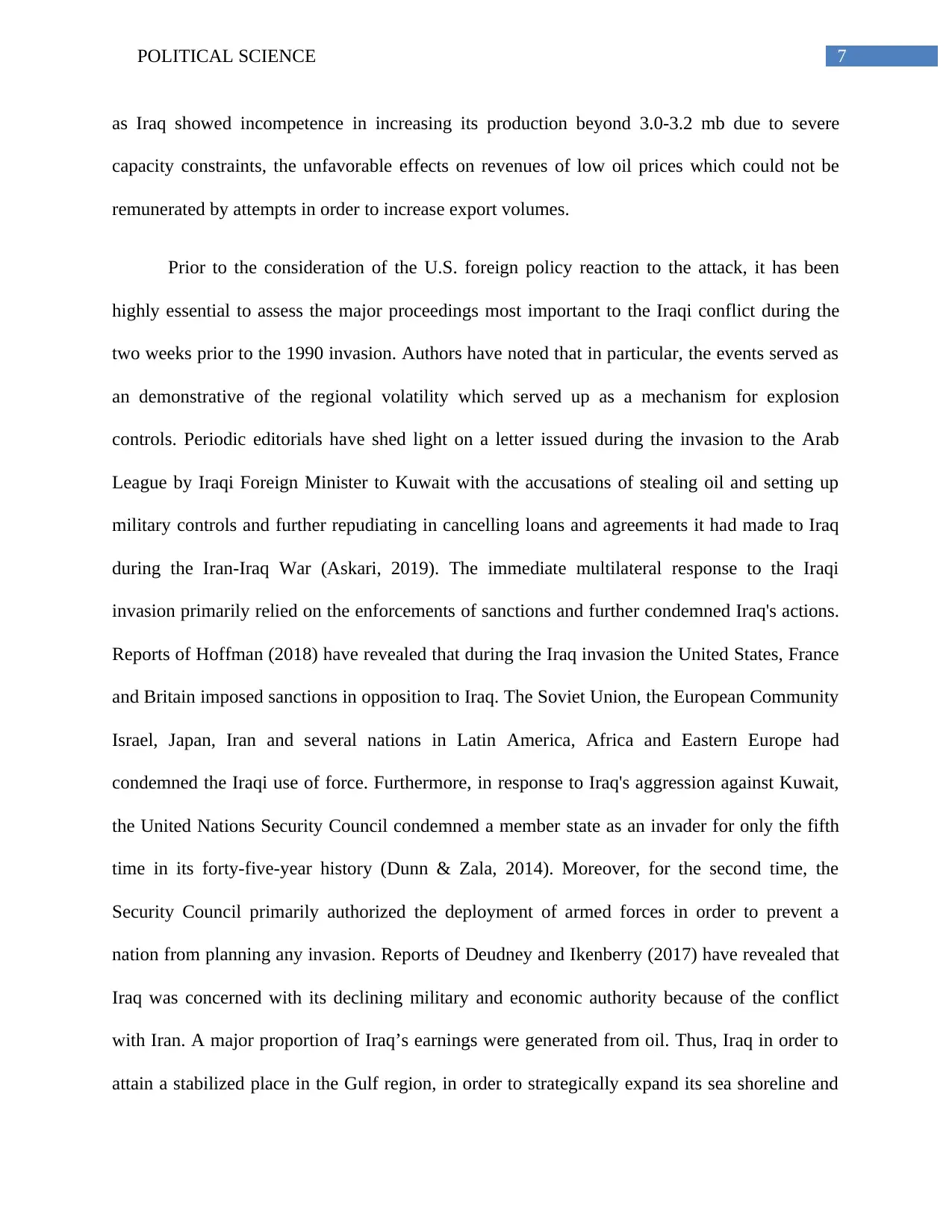
7POLITICAL SCIENCE
as Iraq showed incompetence in increasing its production beyond 3.0-3.2 mb due to severe
capacity constraints, the unfavorable effects on revenues of low oil prices which could not be
remunerated by attempts in order to increase export volumes.
Prior to the consideration of the U.S. foreign policy reaction to the attack, it has been
highly essential to assess the major proceedings most important to the Iraqi conflict during the
two weeks prior to the 1990 invasion. Authors have noted that in particular, the events served as
an demonstrative of the regional volatility which served up as a mechanism for explosion
controls. Periodic editorials have shed light on a letter issued during the invasion to the Arab
League by Iraqi Foreign Minister to Kuwait with the accusations of stealing oil and setting up
military controls and further repudiating in cancelling loans and agreements it had made to Iraq
during the Iran-Iraq War (Askari, 2019). The immediate multilateral response to the Iraqi
invasion primarily relied on the enforcements of sanctions and further condemned Iraq's actions.
Reports of Hoffman (2018) have revealed that during the Iraq invasion the United States, France
and Britain imposed sanctions in opposition to Iraq. The Soviet Union, the European Community
Israel, Japan, Iran and several nations in Latin America, Africa and Eastern Europe had
condemned the Iraqi use of force. Furthermore, in response to Iraq's aggression against Kuwait,
the United Nations Security Council condemned a member state as an invader for only the fifth
time in its forty-five-year history (Dunn & Zala, 2014). Moreover, for the second time, the
Security Council primarily authorized the deployment of armed forces in order to prevent a
nation from planning any invasion. Reports of Deudney and Ikenberry (2017) have revealed that
Iraq was concerned with its declining military and economic authority because of the conflict
with Iran. A major proportion of Iraq’s earnings were generated from oil. Thus, Iraq in order to
attain a stabilized place in the Gulf region, in order to strategically expand its sea shoreline and
as Iraq showed incompetence in increasing its production beyond 3.0-3.2 mb due to severe
capacity constraints, the unfavorable effects on revenues of low oil prices which could not be
remunerated by attempts in order to increase export volumes.
Prior to the consideration of the U.S. foreign policy reaction to the attack, it has been
highly essential to assess the major proceedings most important to the Iraqi conflict during the
two weeks prior to the 1990 invasion. Authors have noted that in particular, the events served as
an demonstrative of the regional volatility which served up as a mechanism for explosion
controls. Periodic editorials have shed light on a letter issued during the invasion to the Arab
League by Iraqi Foreign Minister to Kuwait with the accusations of stealing oil and setting up
military controls and further repudiating in cancelling loans and agreements it had made to Iraq
during the Iran-Iraq War (Askari, 2019). The immediate multilateral response to the Iraqi
invasion primarily relied on the enforcements of sanctions and further condemned Iraq's actions.
Reports of Hoffman (2018) have revealed that during the Iraq invasion the United States, France
and Britain imposed sanctions in opposition to Iraq. The Soviet Union, the European Community
Israel, Japan, Iran and several nations in Latin America, Africa and Eastern Europe had
condemned the Iraqi use of force. Furthermore, in response to Iraq's aggression against Kuwait,
the United Nations Security Council condemned a member state as an invader for only the fifth
time in its forty-five-year history (Dunn & Zala, 2014). Moreover, for the second time, the
Security Council primarily authorized the deployment of armed forces in order to prevent a
nation from planning any invasion. Reports of Deudney and Ikenberry (2017) have revealed that
Iraq was concerned with its declining military and economic authority because of the conflict
with Iran. A major proportion of Iraq’s earnings were generated from oil. Thus, Iraq in order to
attain a stabilized place in the Gulf region, in order to strategically expand its sea shoreline and
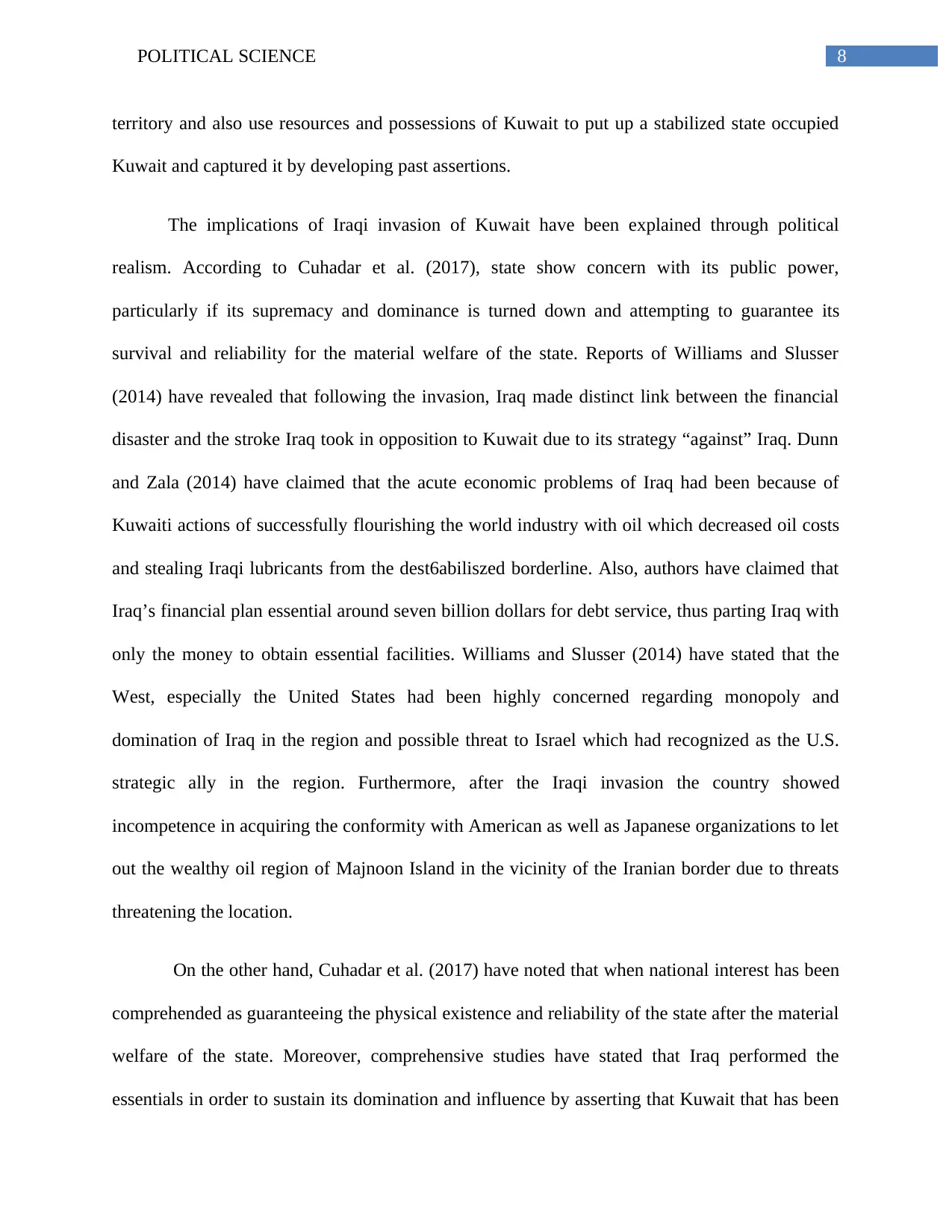
8POLITICAL SCIENCE
territory and also use resources and possessions of Kuwait to put up a stabilized state occupied
Kuwait and captured it by developing past assertions.
The implications of Iraqi invasion of Kuwait have been explained through political
realism. According to Cuhadar et al. (2017), state show concern with its public power,
particularly if its supremacy and dominance is turned down and attempting to guarantee its
survival and reliability for the material welfare of the state. Reports of Williams and Slusser
(2014) have revealed that following the invasion, Iraq made distinct link between the financial
disaster and the stroke Iraq took in opposition to Kuwait due to its strategy “against” Iraq. Dunn
and Zala (2014) have claimed that the acute economic problems of Iraq had been because of
Kuwaiti actions of successfully flourishing the world industry with oil which decreased oil costs
and stealing Iraqi lubricants from the dest6abiliszed borderline. Also, authors have claimed that
Iraq’s financial plan essential around seven billion dollars for debt service, thus parting Iraq with
only the money to obtain essential facilities. Williams and Slusser (2014) have stated that the
West, especially the United States had been highly concerned regarding monopoly and
domination of Iraq in the region and possible threat to Israel which had recognized as the U.S.
strategic ally in the region. Furthermore, after the Iraqi invasion the country showed
incompetence in acquiring the conformity with American as well as Japanese organizations to let
out the wealthy oil region of Majnoon Island in the vicinity of the Iranian border due to threats
threatening the location.
On the other hand, Cuhadar et al. (2017) have noted that when national interest has been
comprehended as guaranteeing the physical existence and reliability of the state after the material
welfare of the state. Moreover, comprehensive studies have stated that Iraq performed the
essentials in order to sustain its domination and influence by asserting that Kuwait that has been
territory and also use resources and possessions of Kuwait to put up a stabilized state occupied
Kuwait and captured it by developing past assertions.
The implications of Iraqi invasion of Kuwait have been explained through political
realism. According to Cuhadar et al. (2017), state show concern with its public power,
particularly if its supremacy and dominance is turned down and attempting to guarantee its
survival and reliability for the material welfare of the state. Reports of Williams and Slusser
(2014) have revealed that following the invasion, Iraq made distinct link between the financial
disaster and the stroke Iraq took in opposition to Kuwait due to its strategy “against” Iraq. Dunn
and Zala (2014) have claimed that the acute economic problems of Iraq had been because of
Kuwaiti actions of successfully flourishing the world industry with oil which decreased oil costs
and stealing Iraqi lubricants from the dest6abiliszed borderline. Also, authors have claimed that
Iraq’s financial plan essential around seven billion dollars for debt service, thus parting Iraq with
only the money to obtain essential facilities. Williams and Slusser (2014) have stated that the
West, especially the United States had been highly concerned regarding monopoly and
domination of Iraq in the region and possible threat to Israel which had recognized as the U.S.
strategic ally in the region. Furthermore, after the Iraqi invasion the country showed
incompetence in acquiring the conformity with American as well as Japanese organizations to let
out the wealthy oil region of Majnoon Island in the vicinity of the Iranian border due to threats
threatening the location.
On the other hand, Cuhadar et al. (2017) have noted that when national interest has been
comprehended as guaranteeing the physical existence and reliability of the state after the material
welfare of the state. Moreover, comprehensive studies have stated that Iraq performed the
essentials in order to sustain its domination and influence by asserting that Kuwait that has been
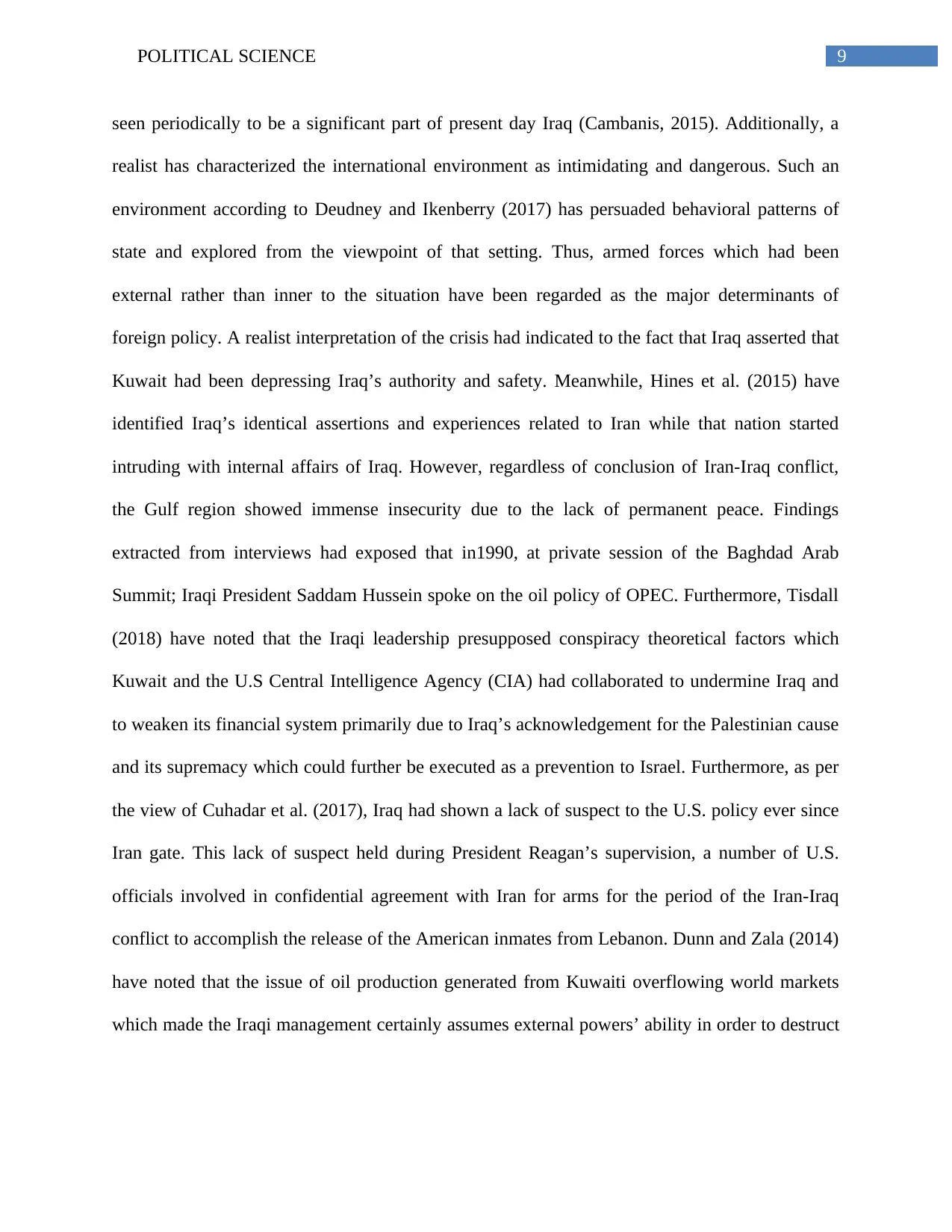
9POLITICAL SCIENCE
seen periodically to be a significant part of present day Iraq (Cambanis, 2015). Additionally, a
realist has characterized the international environment as intimidating and dangerous. Such an
environment according to Deudney and Ikenberry (2017) has persuaded behavioral patterns of
state and explored from the viewpoint of that setting. Thus, armed forces which had been
external rather than inner to the situation have been regarded as the major determinants of
foreign policy. A realist interpretation of the crisis had indicated to the fact that Iraq asserted that
Kuwait had been depressing Iraq’s authority and safety. Meanwhile, Hines et al. (2015) have
identified Iraq’s identical assertions and experiences related to Iran while that nation started
intruding with internal affairs of Iraq. However, regardless of conclusion of Iran-Iraq conflict,
the Gulf region showed immense insecurity due to the lack of permanent peace. Findings
extracted from interviews had exposed that in1990, at private session of the Baghdad Arab
Summit; Iraqi President Saddam Hussein spoke on the oil policy of OPEC. Furthermore, Tisdall
(2018) have noted that the Iraqi leadership presupposed conspiracy theoretical factors which
Kuwait and the U.S Central Intelligence Agency (CIA) had collaborated to undermine Iraq and
to weaken its financial system primarily due to Iraq’s acknowledgement for the Palestinian cause
and its supremacy which could further be executed as a prevention to Israel. Furthermore, as per
the view of Cuhadar et al. (2017), Iraq had shown a lack of suspect to the U.S. policy ever since
Iran gate. This lack of suspect held during President Reagan’s supervision, a number of U.S.
officials involved in confidential agreement with Iran for arms for the period of the Iran-Iraq
conflict to accomplish the release of the American inmates from Lebanon. Dunn and Zala (2014)
have noted that the issue of oil production generated from Kuwaiti overflowing world markets
which made the Iraqi management certainly assumes external powers’ ability in order to destruct
seen periodically to be a significant part of present day Iraq (Cambanis, 2015). Additionally, a
realist has characterized the international environment as intimidating and dangerous. Such an
environment according to Deudney and Ikenberry (2017) has persuaded behavioral patterns of
state and explored from the viewpoint of that setting. Thus, armed forces which had been
external rather than inner to the situation have been regarded as the major determinants of
foreign policy. A realist interpretation of the crisis had indicated to the fact that Iraq asserted that
Kuwait had been depressing Iraq’s authority and safety. Meanwhile, Hines et al. (2015) have
identified Iraq’s identical assertions and experiences related to Iran while that nation started
intruding with internal affairs of Iraq. However, regardless of conclusion of Iran-Iraq conflict,
the Gulf region showed immense insecurity due to the lack of permanent peace. Findings
extracted from interviews had exposed that in1990, at private session of the Baghdad Arab
Summit; Iraqi President Saddam Hussein spoke on the oil policy of OPEC. Furthermore, Tisdall
(2018) have noted that the Iraqi leadership presupposed conspiracy theoretical factors which
Kuwait and the U.S Central Intelligence Agency (CIA) had collaborated to undermine Iraq and
to weaken its financial system primarily due to Iraq’s acknowledgement for the Palestinian cause
and its supremacy which could further be executed as a prevention to Israel. Furthermore, as per
the view of Cuhadar et al. (2017), Iraq had shown a lack of suspect to the U.S. policy ever since
Iran gate. This lack of suspect held during President Reagan’s supervision, a number of U.S.
officials involved in confidential agreement with Iran for arms for the period of the Iran-Iraq
conflict to accomplish the release of the American inmates from Lebanon. Dunn and Zala (2014)
have noted that the issue of oil production generated from Kuwaiti overflowing world markets
which made the Iraqi management certainly assumes external powers’ ability in order to destruct
Secure Best Marks with AI Grader
Need help grading? Try our AI Grader for instant feedback on your assignments.
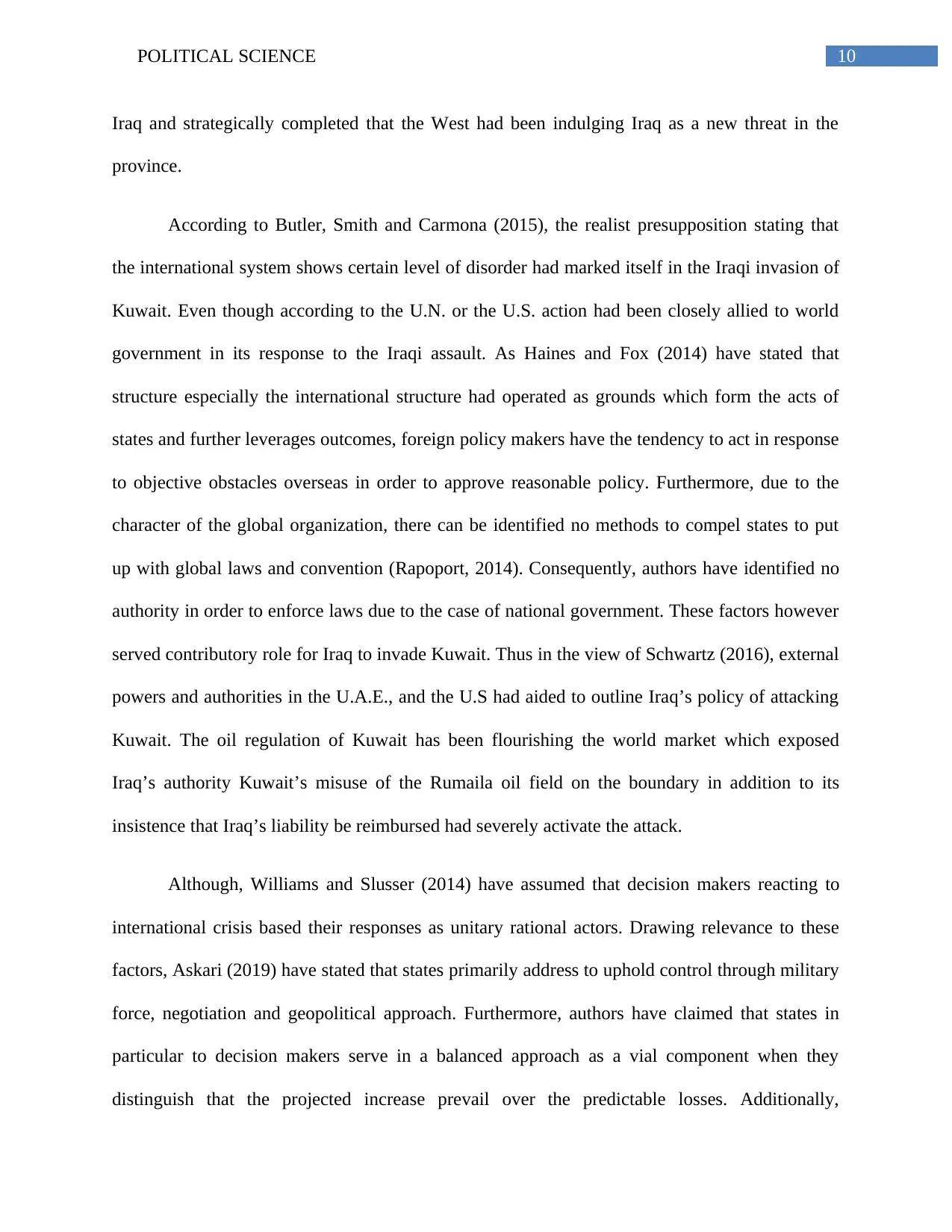
10POLITICAL SCIENCE
Iraq and strategically completed that the West had been indulging Iraq as a new threat in the
province.
According to Butler, Smith and Carmona (2015), the realist presupposition stating that
the international system shows certain level of disorder had marked itself in the Iraqi invasion of
Kuwait. Even though according to the U.N. or the U.S. action had been closely allied to world
government in its response to the Iraqi assault. As Haines and Fox (2014) have stated that
structure especially the international structure had operated as grounds which form the acts of
states and further leverages outcomes, foreign policy makers have the tendency to act in response
to objective obstacles overseas in order to approve reasonable policy. Furthermore, due to the
character of the global organization, there can be identified no methods to compel states to put
up with global laws and convention (Rapoport, 2014). Consequently, authors have identified no
authority in order to enforce laws due to the case of national government. These factors however
served contributory role for Iraq to invade Kuwait. Thus in the view of Schwartz (2016), external
powers and authorities in the U.A.E., and the U.S had aided to outline Iraq’s policy of attacking
Kuwait. The oil regulation of Kuwait has been flourishing the world market which exposed
Iraq’s authority Kuwait’s misuse of the Rumaila oil field on the boundary in addition to its
insistence that Iraq’s liability be reimbursed had severely activate the attack.
Although, Williams and Slusser (2014) have assumed that decision makers reacting to
international crisis based their responses as unitary rational actors. Drawing relevance to these
factors, Askari (2019) have stated that states primarily address to uphold control through military
force, negotiation and geopolitical approach. Furthermore, authors have claimed that states in
particular to decision makers serve in a balanced approach as a vial component when they
distinguish that the projected increase prevail over the predictable losses. Additionally,
Iraq and strategically completed that the West had been indulging Iraq as a new threat in the
province.
According to Butler, Smith and Carmona (2015), the realist presupposition stating that
the international system shows certain level of disorder had marked itself in the Iraqi invasion of
Kuwait. Even though according to the U.N. or the U.S. action had been closely allied to world
government in its response to the Iraqi assault. As Haines and Fox (2014) have stated that
structure especially the international structure had operated as grounds which form the acts of
states and further leverages outcomes, foreign policy makers have the tendency to act in response
to objective obstacles overseas in order to approve reasonable policy. Furthermore, due to the
character of the global organization, there can be identified no methods to compel states to put
up with global laws and convention (Rapoport, 2014). Consequently, authors have identified no
authority in order to enforce laws due to the case of national government. These factors however
served contributory role for Iraq to invade Kuwait. Thus in the view of Schwartz (2016), external
powers and authorities in the U.A.E., and the U.S had aided to outline Iraq’s policy of attacking
Kuwait. The oil regulation of Kuwait has been flourishing the world market which exposed
Iraq’s authority Kuwait’s misuse of the Rumaila oil field on the boundary in addition to its
insistence that Iraq’s liability be reimbursed had severely activate the attack.
Although, Williams and Slusser (2014) have assumed that decision makers reacting to
international crisis based their responses as unitary rational actors. Drawing relevance to these
factors, Askari (2019) have stated that states primarily address to uphold control through military
force, negotiation and geopolitical approach. Furthermore, authors have claimed that states in
particular to decision makers serve in a balanced approach as a vial component when they
distinguish that the projected increase prevail over the predictable losses. Additionally,
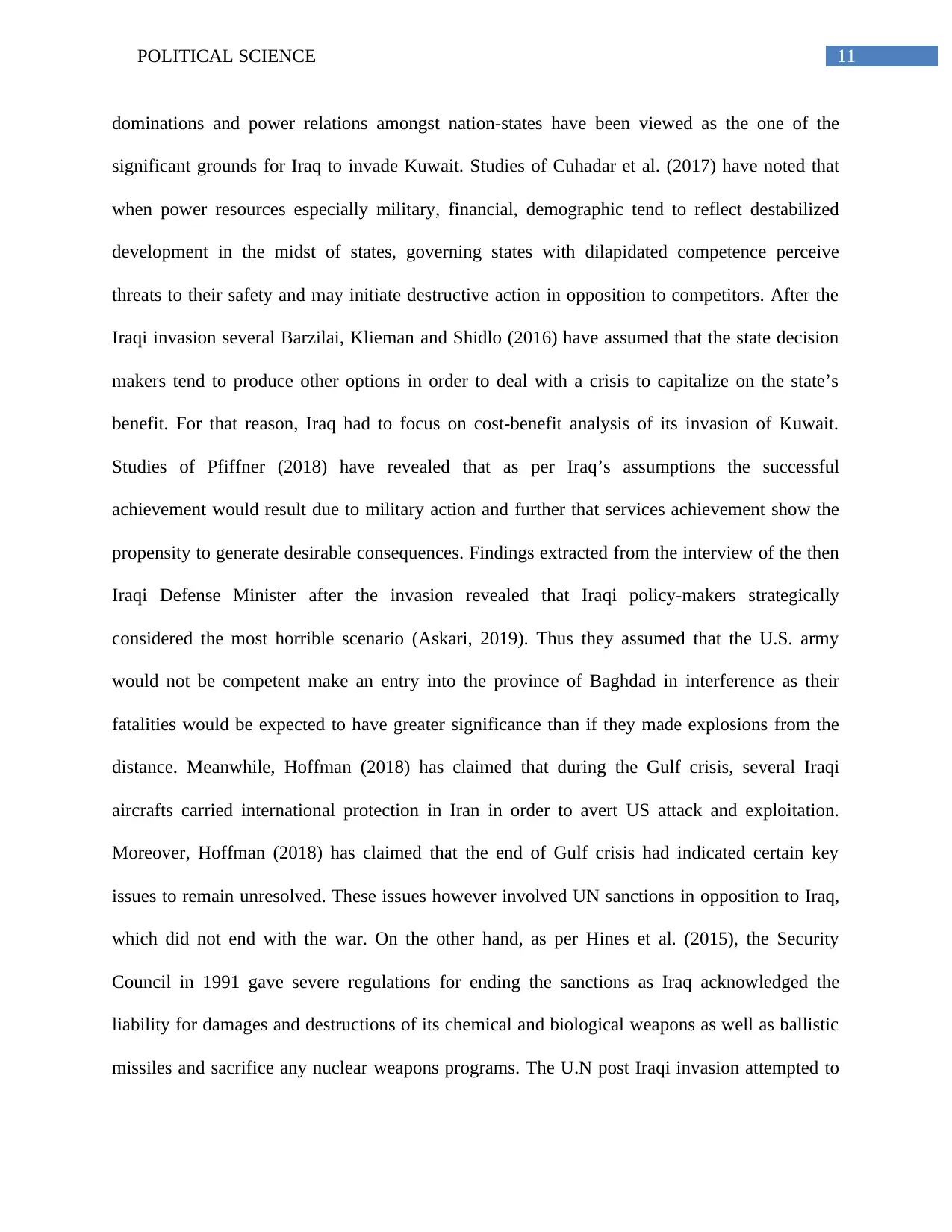
11POLITICAL SCIENCE
dominations and power relations amongst nation-states have been viewed as the one of the
significant grounds for Iraq to invade Kuwait. Studies of Cuhadar et al. (2017) have noted that
when power resources especially military, financial, demographic tend to reflect destabilized
development in the midst of states, governing states with dilapidated competence perceive
threats to their safety and may initiate destructive action in opposition to competitors. After the
Iraqi invasion several Barzilai, Klieman and Shidlo (2016) have assumed that the state decision
makers tend to produce other options in order to deal with a crisis to capitalize on the state’s
benefit. For that reason, Iraq had to focus on cost-benefit analysis of its invasion of Kuwait.
Studies of Pfiffner (2018) have revealed that as per Iraq’s assumptions the successful
achievement would result due to military action and further that services achievement show the
propensity to generate desirable consequences. Findings extracted from the interview of the then
Iraqi Defense Minister after the invasion revealed that Iraqi policy-makers strategically
considered the most horrible scenario (Askari, 2019). Thus they assumed that the U.S. army
would not be competent make an entry into the province of Baghdad in interference as their
fatalities would be expected to have greater significance than if they made explosions from the
distance. Meanwhile, Hoffman (2018) has claimed that during the Gulf crisis, several Iraqi
aircrafts carried international protection in Iran in order to avert US attack and exploitation.
Moreover, Hoffman (2018) has claimed that the end of Gulf crisis had indicated certain key
issues to remain unresolved. These issues however involved UN sanctions in opposition to Iraq,
which did not end with the war. On the other hand, as per Hines et al. (2015), the Security
Council in 1991 gave severe regulations for ending the sanctions as Iraq acknowledged the
liability for damages and destructions of its chemical and biological weapons as well as ballistic
missiles and sacrifice any nuclear weapons programs. The U.N post Iraqi invasion attempted to
dominations and power relations amongst nation-states have been viewed as the one of the
significant grounds for Iraq to invade Kuwait. Studies of Cuhadar et al. (2017) have noted that
when power resources especially military, financial, demographic tend to reflect destabilized
development in the midst of states, governing states with dilapidated competence perceive
threats to their safety and may initiate destructive action in opposition to competitors. After the
Iraqi invasion several Barzilai, Klieman and Shidlo (2016) have assumed that the state decision
makers tend to produce other options in order to deal with a crisis to capitalize on the state’s
benefit. For that reason, Iraq had to focus on cost-benefit analysis of its invasion of Kuwait.
Studies of Pfiffner (2018) have revealed that as per Iraq’s assumptions the successful
achievement would result due to military action and further that services achievement show the
propensity to generate desirable consequences. Findings extracted from the interview of the then
Iraqi Defense Minister after the invasion revealed that Iraqi policy-makers strategically
considered the most horrible scenario (Askari, 2019). Thus they assumed that the U.S. army
would not be competent make an entry into the province of Baghdad in interference as their
fatalities would be expected to have greater significance than if they made explosions from the
distance. Meanwhile, Hoffman (2018) has claimed that during the Gulf crisis, several Iraqi
aircrafts carried international protection in Iran in order to avert US attack and exploitation.
Moreover, Hoffman (2018) has claimed that the end of Gulf crisis had indicated certain key
issues to remain unresolved. These issues however involved UN sanctions in opposition to Iraq,
which did not end with the war. On the other hand, as per Hines et al. (2015), the Security
Council in 1991 gave severe regulations for ending the sanctions as Iraq acknowledged the
liability for damages and destructions of its chemical and biological weapons as well as ballistic
missiles and sacrifice any nuclear weapons programs. The U.N post Iraqi invasion attempted to
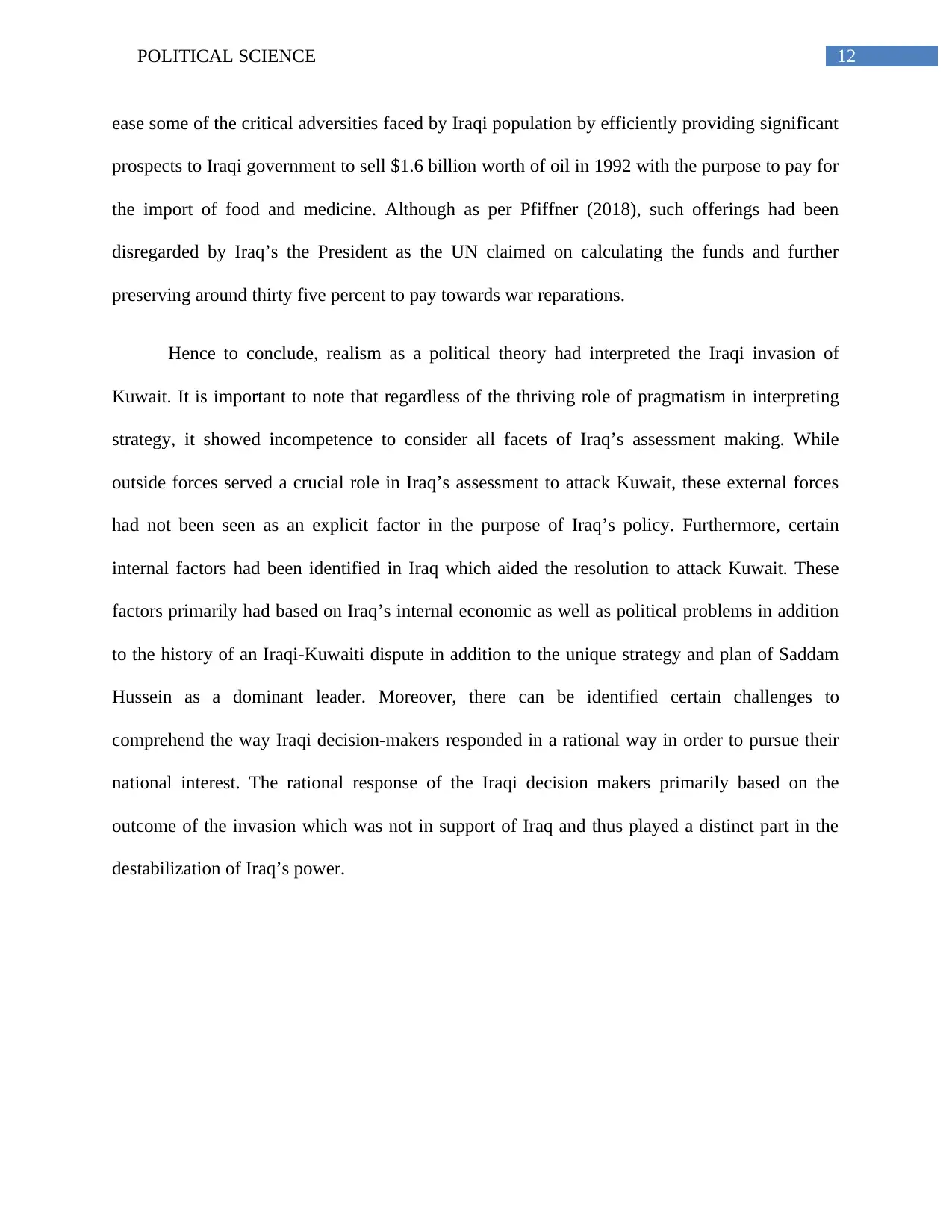
12POLITICAL SCIENCE
ease some of the critical adversities faced by Iraqi population by efficiently providing significant
prospects to Iraqi government to sell $1.6 billion worth of oil in 1992 with the purpose to pay for
the import of food and medicine. Although as per Pfiffner (2018), such offerings had been
disregarded by Iraq’s the President as the UN claimed on calculating the funds and further
preserving around thirty five percent to pay towards war reparations.
Hence to conclude, realism as a political theory had interpreted the Iraqi invasion of
Kuwait. It is important to note that regardless of the thriving role of pragmatism in interpreting
strategy, it showed incompetence to consider all facets of Iraq’s assessment making. While
outside forces served a crucial role in Iraq’s assessment to attack Kuwait, these external forces
had not been seen as an explicit factor in the purpose of Iraq’s policy. Furthermore, certain
internal factors had been identified in Iraq which aided the resolution to attack Kuwait. These
factors primarily had based on Iraq’s internal economic as well as political problems in addition
to the history of an Iraqi-Kuwaiti dispute in addition to the unique strategy and plan of Saddam
Hussein as a dominant leader. Moreover, there can be identified certain challenges to
comprehend the way Iraqi decision-makers responded in a rational way in order to pursue their
national interest. The rational response of the Iraqi decision makers primarily based on the
outcome of the invasion which was not in support of Iraq and thus played a distinct part in the
destabilization of Iraq’s power.
ease some of the critical adversities faced by Iraqi population by efficiently providing significant
prospects to Iraqi government to sell $1.6 billion worth of oil in 1992 with the purpose to pay for
the import of food and medicine. Although as per Pfiffner (2018), such offerings had been
disregarded by Iraq’s the President as the UN claimed on calculating the funds and further
preserving around thirty five percent to pay towards war reparations.
Hence to conclude, realism as a political theory had interpreted the Iraqi invasion of
Kuwait. It is important to note that regardless of the thriving role of pragmatism in interpreting
strategy, it showed incompetence to consider all facets of Iraq’s assessment making. While
outside forces served a crucial role in Iraq’s assessment to attack Kuwait, these external forces
had not been seen as an explicit factor in the purpose of Iraq’s policy. Furthermore, certain
internal factors had been identified in Iraq which aided the resolution to attack Kuwait. These
factors primarily had based on Iraq’s internal economic as well as political problems in addition
to the history of an Iraqi-Kuwaiti dispute in addition to the unique strategy and plan of Saddam
Hussein as a dominant leader. Moreover, there can be identified certain challenges to
comprehend the way Iraqi decision-makers responded in a rational way in order to pursue their
national interest. The rational response of the Iraqi decision makers primarily based on the
outcome of the invasion which was not in support of Iraq and thus played a distinct part in the
destabilization of Iraq’s power.
Paraphrase This Document
Need a fresh take? Get an instant paraphrase of this document with our AI Paraphraser
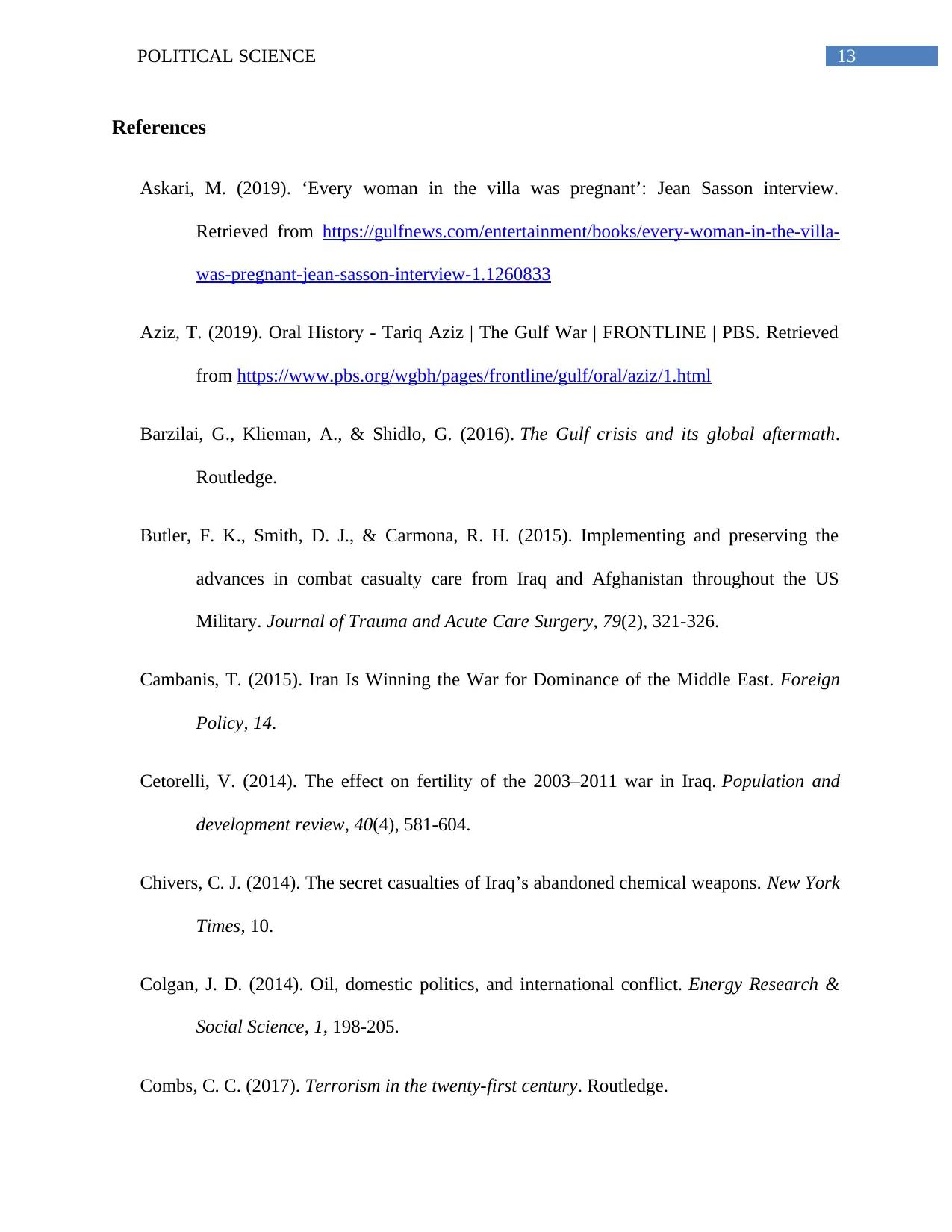
13POLITICAL SCIENCE
References
Askari, M. (2019). ‘Every woman in the villa was pregnant’: Jean Sasson interview.
Retrieved from https://gulfnews.com/entertainment/books/every-woman-in-the-villa-
was-pregnant-jean-sasson-interview-1.1260833
Aziz, T. (2019). Oral History - Tariq Aziz | The Gulf War | FRONTLINE | PBS. Retrieved
from https://www.pbs.org/wgbh/pages/frontline/gulf/oral/aziz/1.html
Barzilai, G., Klieman, A., & Shidlo, G. (2016). The Gulf crisis and its global aftermath.
Routledge.
Butler, F. K., Smith, D. J., & Carmona, R. H. (2015). Implementing and preserving the
advances in combat casualty care from Iraq and Afghanistan throughout the US
Military. Journal of Trauma and Acute Care Surgery, 79(2), 321-326.
Cambanis, T. (2015). Iran Is Winning the War for Dominance of the Middle East. Foreign
Policy, 14.
Cetorelli, V. (2014). The effect on fertility of the 2003–2011 war in Iraq. Population and
development review, 40(4), 581-604.
Chivers, C. J. (2014). The secret casualties of Iraq’s abandoned chemical weapons. New York
Times, 10.
Colgan, J. D. (2014). Oil, domestic politics, and international conflict. Energy Research &
Social Science, 1, 198-205.
Combs, C. C. (2017). Terrorism in the twenty-first century. Routledge.
References
Askari, M. (2019). ‘Every woman in the villa was pregnant’: Jean Sasson interview.
Retrieved from https://gulfnews.com/entertainment/books/every-woman-in-the-villa-
was-pregnant-jean-sasson-interview-1.1260833
Aziz, T. (2019). Oral History - Tariq Aziz | The Gulf War | FRONTLINE | PBS. Retrieved
from https://www.pbs.org/wgbh/pages/frontline/gulf/oral/aziz/1.html
Barzilai, G., Klieman, A., & Shidlo, G. (2016). The Gulf crisis and its global aftermath.
Routledge.
Butler, F. K., Smith, D. J., & Carmona, R. H. (2015). Implementing and preserving the
advances in combat casualty care from Iraq and Afghanistan throughout the US
Military. Journal of Trauma and Acute Care Surgery, 79(2), 321-326.
Cambanis, T. (2015). Iran Is Winning the War for Dominance of the Middle East. Foreign
Policy, 14.
Cetorelli, V. (2014). The effect on fertility of the 2003–2011 war in Iraq. Population and
development review, 40(4), 581-604.
Chivers, C. J. (2014). The secret casualties of Iraq’s abandoned chemical weapons. New York
Times, 10.
Colgan, J. D. (2014). Oil, domestic politics, and international conflict. Energy Research &
Social Science, 1, 198-205.
Combs, C. C. (2017). Terrorism in the twenty-first century. Routledge.
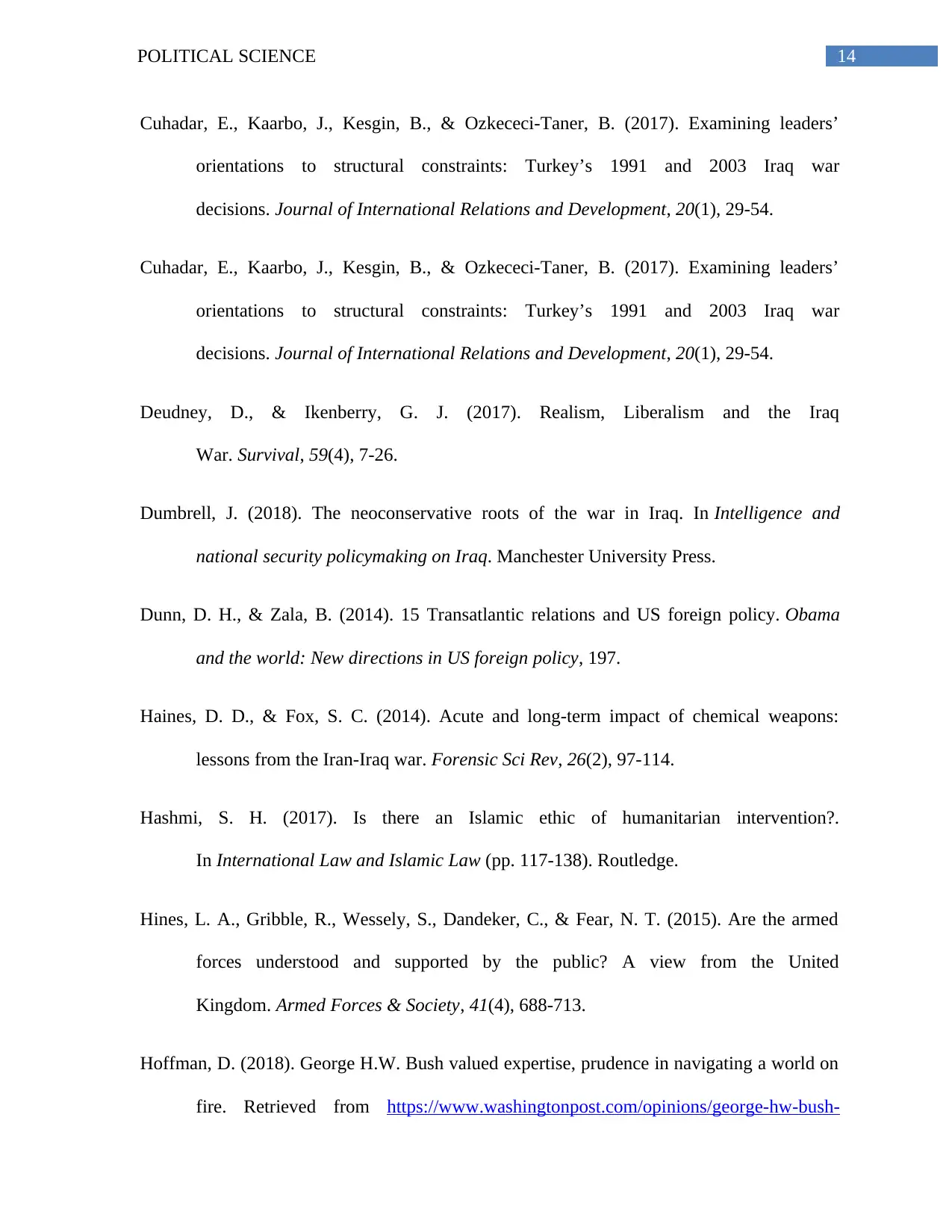
14POLITICAL SCIENCE
Cuhadar, E., Kaarbo, J., Kesgin, B., & Ozkececi-Taner, B. (2017). Examining leaders’
orientations to structural constraints: Turkey’s 1991 and 2003 Iraq war
decisions. Journal of International Relations and Development, 20(1), 29-54.
Cuhadar, E., Kaarbo, J., Kesgin, B., & Ozkececi-Taner, B. (2017). Examining leaders’
orientations to structural constraints: Turkey’s 1991 and 2003 Iraq war
decisions. Journal of International Relations and Development, 20(1), 29-54.
Deudney, D., & Ikenberry, G. J. (2017). Realism, Liberalism and the Iraq
War. Survival, 59(4), 7-26.
Dumbrell, J. (2018). The neoconservative roots of the war in Iraq. In Intelligence and
national security policymaking on Iraq. Manchester University Press.
Dunn, D. H., & Zala, B. (2014). 15 Transatlantic relations and US foreign policy. Obama
and the world: New directions in US foreign policy, 197.
Haines, D. D., & Fox, S. C. (2014). Acute and long-term impact of chemical weapons:
lessons from the Iran-Iraq war. Forensic Sci Rev, 26(2), 97-114.
Hashmi, S. H. (2017). Is there an Islamic ethic of humanitarian intervention?.
In International Law and Islamic Law (pp. 117-138). Routledge.
Hines, L. A., Gribble, R., Wessely, S., Dandeker, C., & Fear, N. T. (2015). Are the armed
forces understood and supported by the public? A view from the United
Kingdom. Armed Forces & Society, 41(4), 688-713.
Hoffman, D. (2018). George H.W. Bush valued expertise, prudence in navigating a world on
fire. Retrieved from https://www.washingtonpost.com/opinions/george-hw-bush-
Cuhadar, E., Kaarbo, J., Kesgin, B., & Ozkececi-Taner, B. (2017). Examining leaders’
orientations to structural constraints: Turkey’s 1991 and 2003 Iraq war
decisions. Journal of International Relations and Development, 20(1), 29-54.
Cuhadar, E., Kaarbo, J., Kesgin, B., & Ozkececi-Taner, B. (2017). Examining leaders’
orientations to structural constraints: Turkey’s 1991 and 2003 Iraq war
decisions. Journal of International Relations and Development, 20(1), 29-54.
Deudney, D., & Ikenberry, G. J. (2017). Realism, Liberalism and the Iraq
War. Survival, 59(4), 7-26.
Dumbrell, J. (2018). The neoconservative roots of the war in Iraq. In Intelligence and
national security policymaking on Iraq. Manchester University Press.
Dunn, D. H., & Zala, B. (2014). 15 Transatlantic relations and US foreign policy. Obama
and the world: New directions in US foreign policy, 197.
Haines, D. D., & Fox, S. C. (2014). Acute and long-term impact of chemical weapons:
lessons from the Iran-Iraq war. Forensic Sci Rev, 26(2), 97-114.
Hashmi, S. H. (2017). Is there an Islamic ethic of humanitarian intervention?.
In International Law and Islamic Law (pp. 117-138). Routledge.
Hines, L. A., Gribble, R., Wessely, S., Dandeker, C., & Fear, N. T. (2015). Are the armed
forces understood and supported by the public? A view from the United
Kingdom. Armed Forces & Society, 41(4), 688-713.
Hoffman, D. (2018). George H.W. Bush valued expertise, prudence in navigating a world on
fire. Retrieved from https://www.washingtonpost.com/opinions/george-hw-bush-
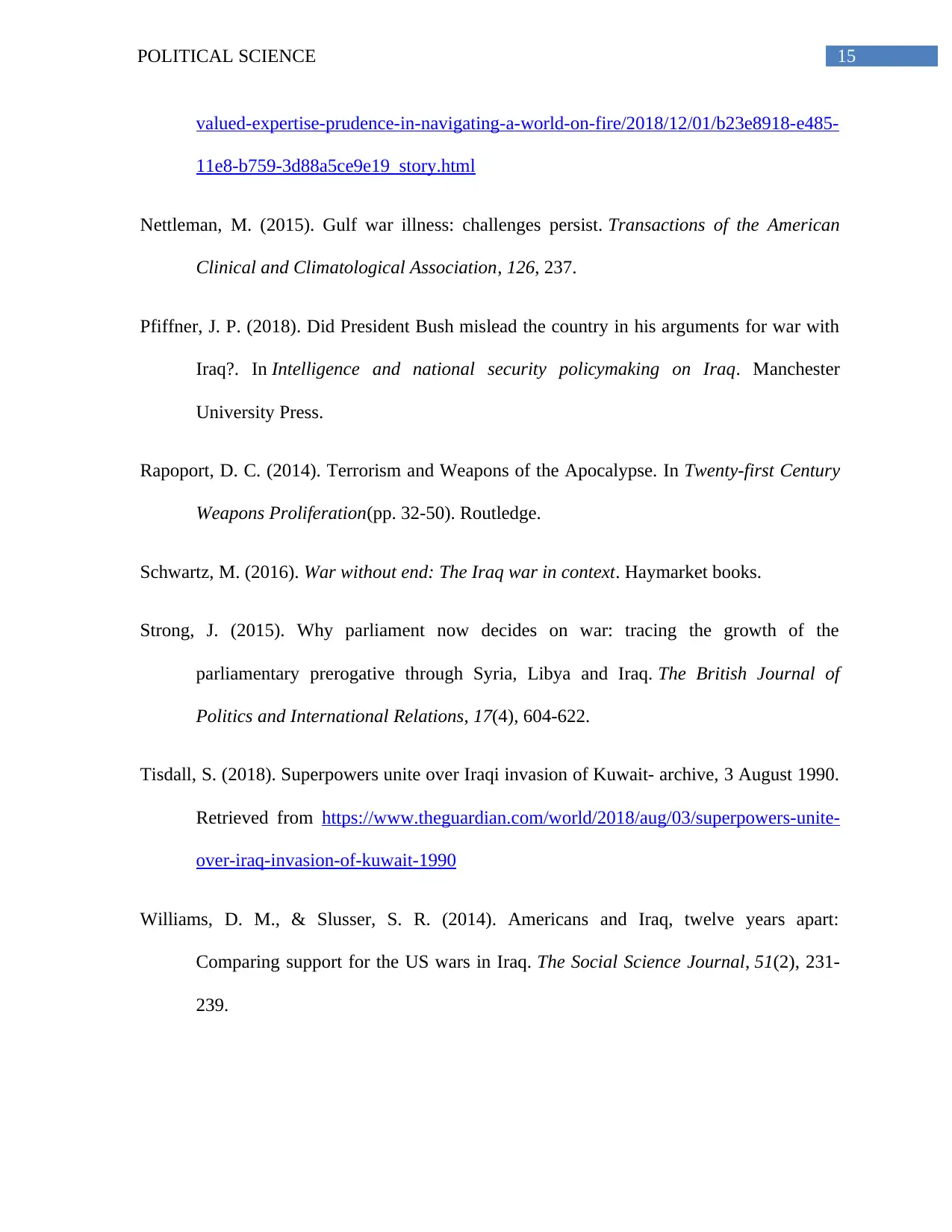
15POLITICAL SCIENCE
valued-expertise-prudence-in-navigating-a-world-on-fire/2018/12/01/b23e8918-e485-
11e8-b759-3d88a5ce9e19_story.html
Nettleman, M. (2015). Gulf war illness: challenges persist. Transactions of the American
Clinical and Climatological Association, 126, 237.
Pfiffner, J. P. (2018). Did President Bush mislead the country in his arguments for war with
Iraq?. In Intelligence and national security policymaking on Iraq. Manchester
University Press.
Rapoport, D. C. (2014). Terrorism and Weapons of the Apocalypse. In Twenty-first Century
Weapons Proliferation(pp. 32-50). Routledge.
Schwartz, M. (2016). War without end: The Iraq war in context. Haymarket books.
Strong, J. (2015). Why parliament now decides on war: tracing the growth of the
parliamentary prerogative through Syria, Libya and Iraq. The British Journal of
Politics and International Relations, 17(4), 604-622.
Tisdall, S. (2018). Superpowers unite over Iraqi invasion of Kuwait- archive, 3 August 1990.
Retrieved from https://www.theguardian.com/world/2018/aug/03/superpowers-unite-
over-iraq-invasion-of-kuwait-1990
Williams, D. M., & Slusser, S. R. (2014). Americans and Iraq, twelve years apart:
Comparing support for the US wars in Iraq. The Social Science Journal, 51(2), 231-
239.
valued-expertise-prudence-in-navigating-a-world-on-fire/2018/12/01/b23e8918-e485-
11e8-b759-3d88a5ce9e19_story.html
Nettleman, M. (2015). Gulf war illness: challenges persist. Transactions of the American
Clinical and Climatological Association, 126, 237.
Pfiffner, J. P. (2018). Did President Bush mislead the country in his arguments for war with
Iraq?. In Intelligence and national security policymaking on Iraq. Manchester
University Press.
Rapoport, D. C. (2014). Terrorism and Weapons of the Apocalypse. In Twenty-first Century
Weapons Proliferation(pp. 32-50). Routledge.
Schwartz, M. (2016). War without end: The Iraq war in context. Haymarket books.
Strong, J. (2015). Why parliament now decides on war: tracing the growth of the
parliamentary prerogative through Syria, Libya and Iraq. The British Journal of
Politics and International Relations, 17(4), 604-622.
Tisdall, S. (2018). Superpowers unite over Iraqi invasion of Kuwait- archive, 3 August 1990.
Retrieved from https://www.theguardian.com/world/2018/aug/03/superpowers-unite-
over-iraq-invasion-of-kuwait-1990
Williams, D. M., & Slusser, S. R. (2014). Americans and Iraq, twelve years apart:
Comparing support for the US wars in Iraq. The Social Science Journal, 51(2), 231-
239.
Secure Best Marks with AI Grader
Need help grading? Try our AI Grader for instant feedback on your assignments.
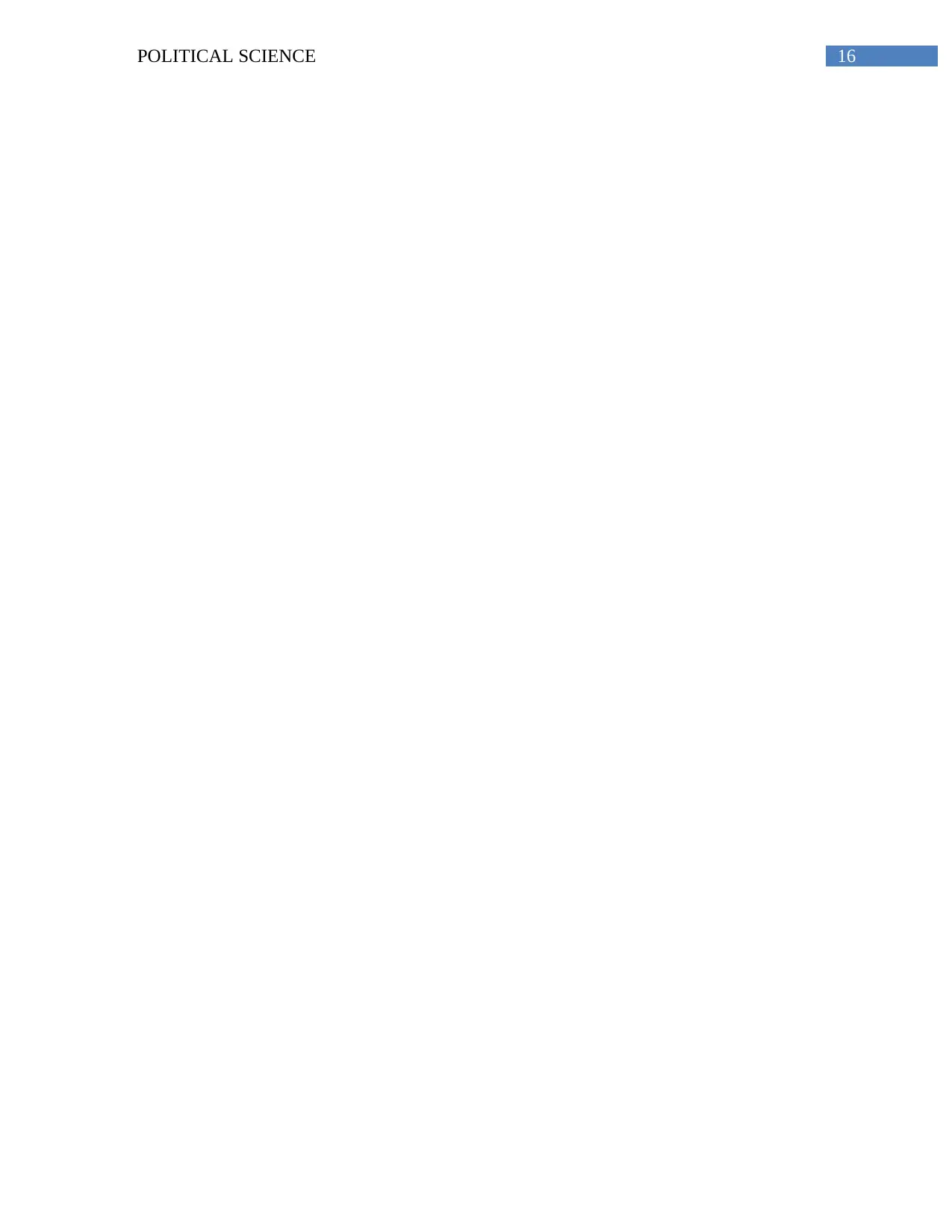
16POLITICAL SCIENCE
1 out of 17
Your All-in-One AI-Powered Toolkit for Academic Success.
+13062052269
info@desklib.com
Available 24*7 on WhatsApp / Email
![[object Object]](/_next/static/media/star-bottom.7253800d.svg)
Unlock your academic potential
© 2024 | Zucol Services PVT LTD | All rights reserved.



